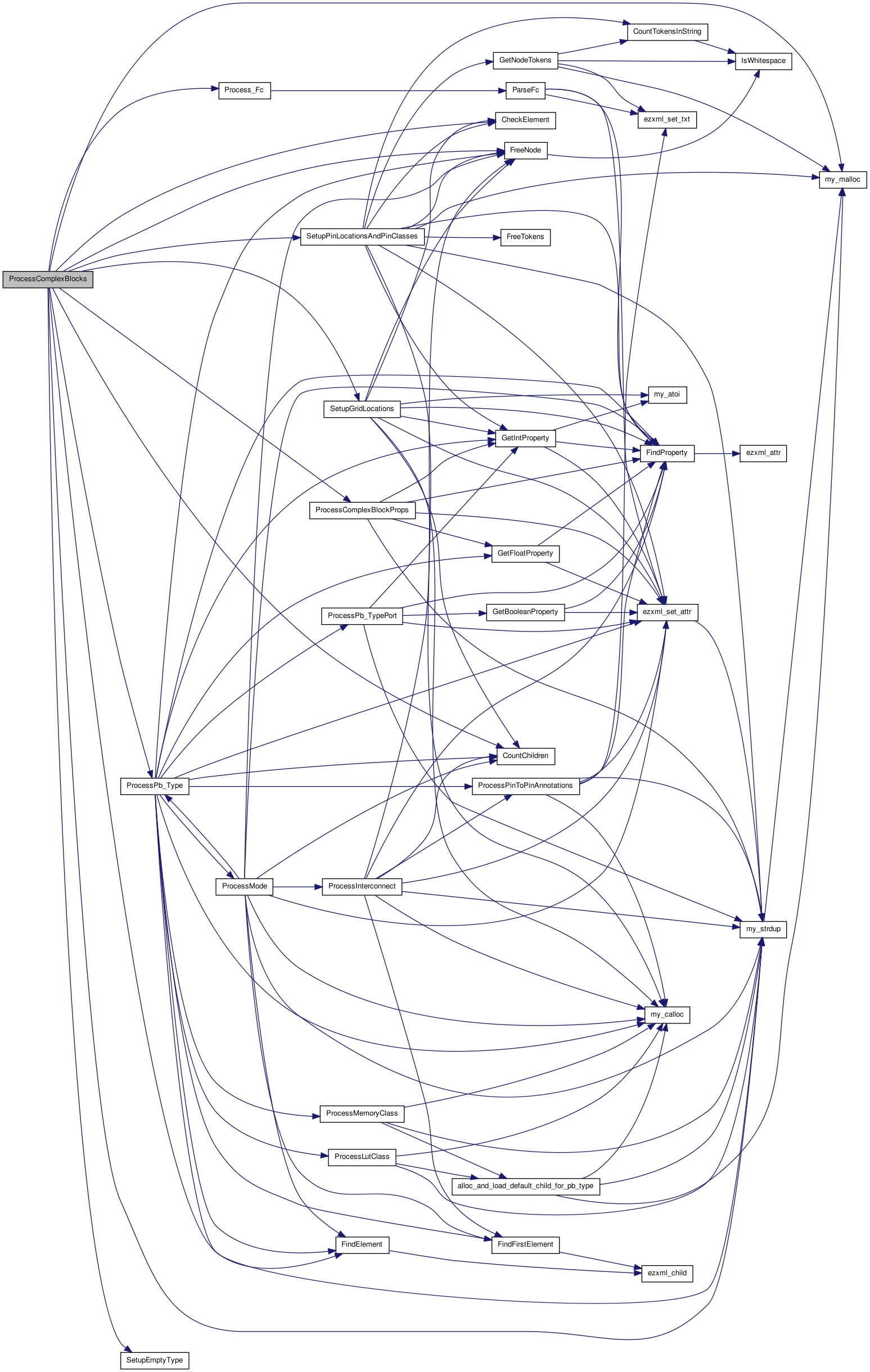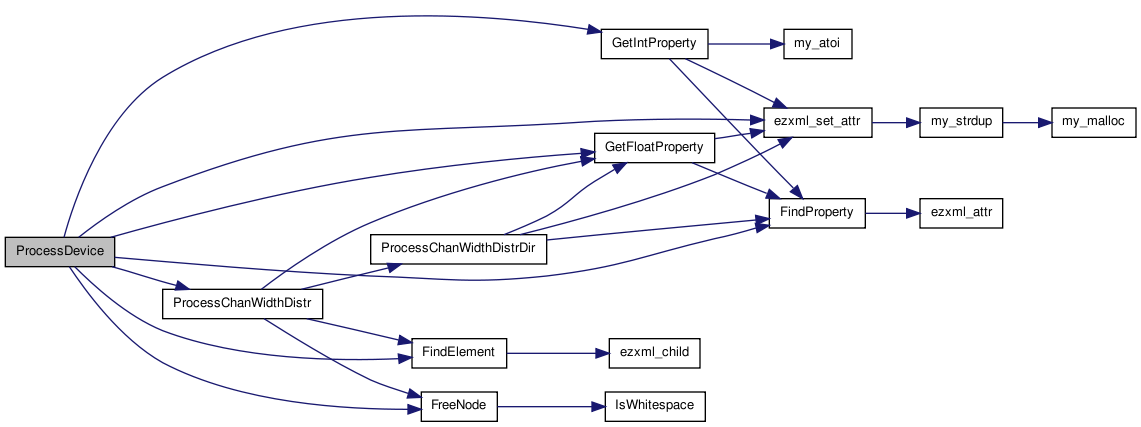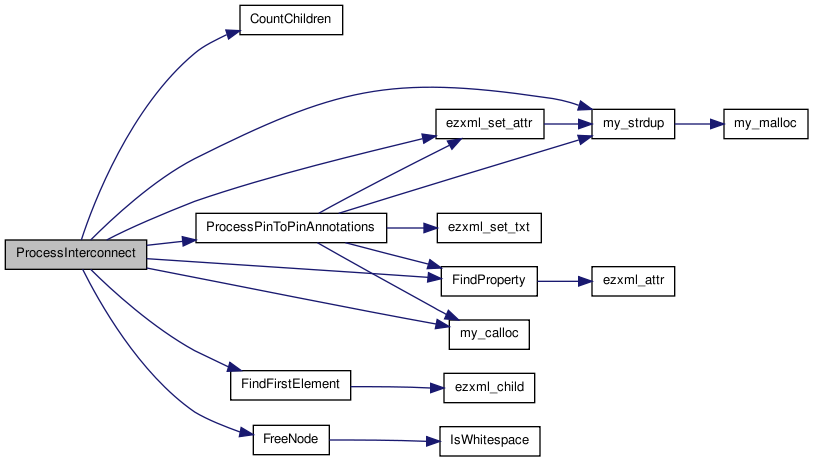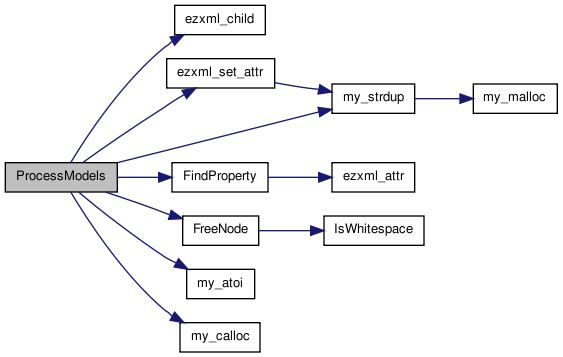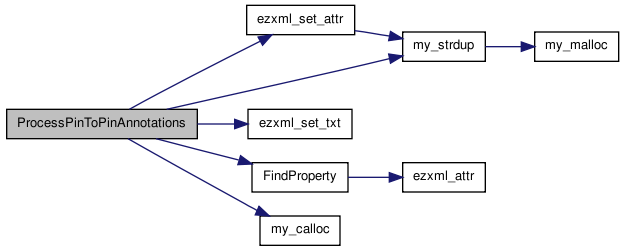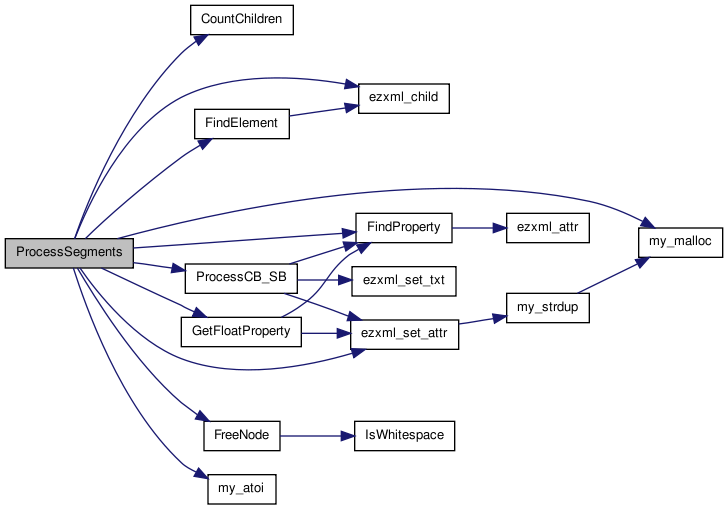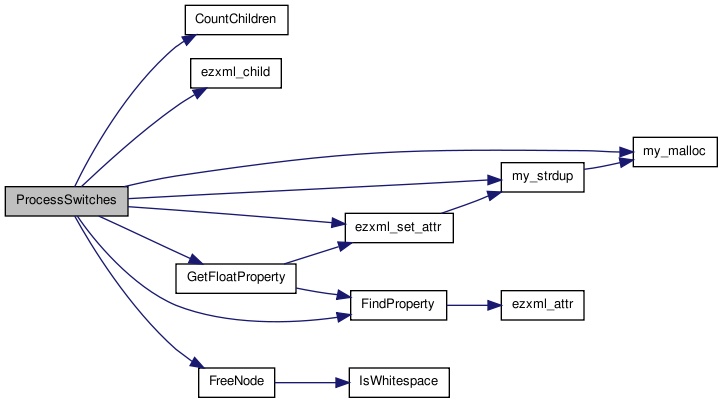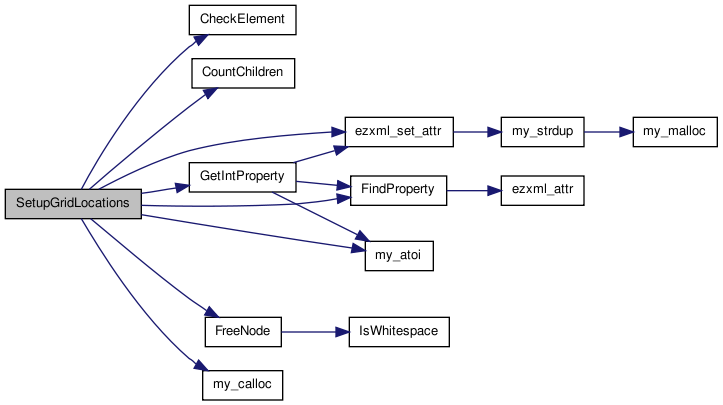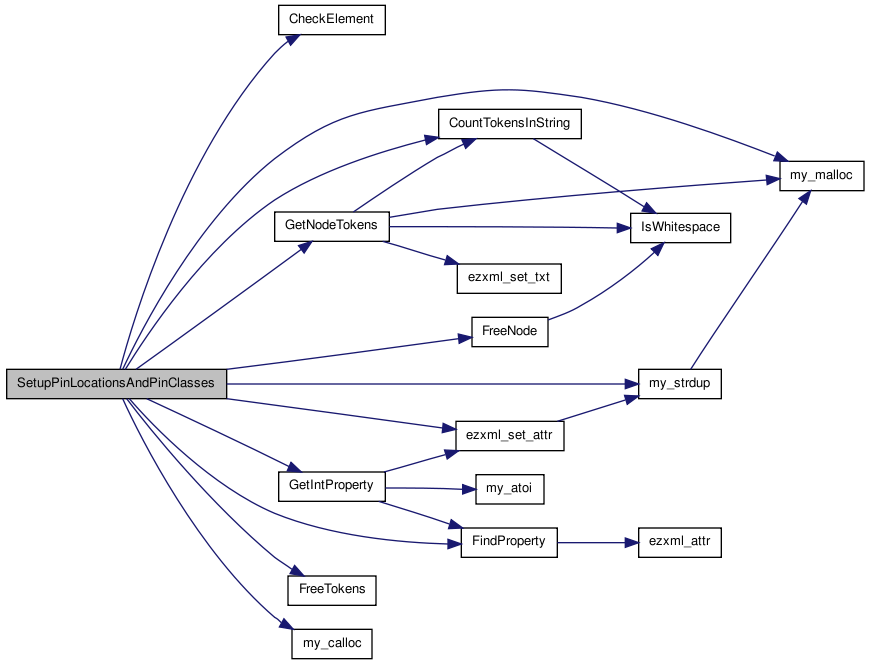libvpr/read_xml_arch_file.c File Reference
#include <string.h>#include <assert.h>#include "util.h"#include "arch_types.h"#include "ReadLine.h"#include "ezxml.h"#include "read_xml_arch_file.h"#include "read_xml_util.h" Include dependency graph for read_xml_arch_file.c:
Include dependency graph for read_xml_arch_file.c:Go to the source code of this file.
Defines | |
| #define | NUM_MODELS_IN_LIBRARY 4 |
| #define | EMPTY_TYPE_INDEX 0 |
| #define | IO_TYPE_INDEX 1 |
Enumerations | |
| enum | Fc_type { FC_ABS, FC_FRAC, FC_FULL } |
Functions | |
| static void | ParseFc (ezxml_t Node, enum Fc_type *Fc, float *Val) |
| static void | SetupEmptyType () |
| static void | SetupPinLocationsAndPinClasses (ezxml_t Locations, t_type_descriptor *Type) |
| static void | SetupGridLocations (ezxml_t Locations, t_type_descriptor *Type) |
| static void | ProcessPb_Type (INOUTP ezxml_t Parent, t_pb_type *pb_type, t_mode *mode) |
| static void | ProcessPb_TypePort (INOUTP ezxml_t Parent, t_port *port) |
| static void | ProcessPinToPinAnnotations (ezxml_t parent, t_pin_to_pin_annotation *annotation) |
| static void | ProcessInterconnect (INOUTP ezxml_t Parent, t_mode *mode) |
| static void | ProcessMode (INOUTP ezxml_t Parent, t_mode *mode) |
| static void | Process_Fc (ezxml_t Fc_in_node, ezxml_t Fc_out_node, t_type_descriptor *Type) |
| static void | ProcessComplexBlockProps (ezxml_t Node, t_type_descriptor *Type) |
| static void | ProcessChanWidthDistr (INOUTP ezxml_t Node, OUTP struct s_arch *arch) |
| static void | ProcessChanWidthDistrDir (INOUTP ezxml_t Node, OUTP t_chan *chan) |
| static void | ProcessModels (INOUTP ezxml_t Node, OUTP struct s_arch *arch) |
| static void | ProcessLayout (INOUTP ezxml_t Node, OUTP struct s_arch *arch) |
| static void | ProcessDevice (INOUTP ezxml_t Node, OUTP struct s_arch *arch, INP boolean timing_enabled) |
| static void | alloc_and_load_default_child_for_pb_type (INOUTP t_pb_type *pb_type, char *new_name, t_pb_type *copy) |
| static void | ProcessLutClass (INOUTP t_pb_type *lut_pb_type) |
| static void | ProcessMemoryClass (INOUTP t_pb_type *mem_pb_type) |
| static void | ProcessComplexBlocks (INOUTP ezxml_t Node, OUTP t_type_descriptor **Types, OUTP int *NumTypes, INP boolean timing_enabled) |
| static void | ProcessSwitches (INOUTP ezxml_t Node, OUTP struct s_switch_inf **Switches, OUTP int *NumSwitches, INP boolean timing_enabled) |
| static void | ProcessSegments (INOUTP ezxml_t Parent, OUTP struct s_segment_inf **Segs, OUTP int *NumSegs, INP struct s_switch_inf *Switches, INP int NumSwitches, INP boolean timing_enabled) |
| static void | ProcessCB_SB (INOUTP ezxml_t Node, INOUTP boolean *list, INP int len) |
| static void | CreateModelLibrary (OUTP struct s_arch *arch) |
| static void | UpdateAndCheckModels (INOUTP struct s_arch *arch) |
| static void | SyncModelsPbTypes (INOUTP struct s_arch *arch, INP t_type_descriptor *Types, INP int NumTypes) |
| static void | AddModelsToPbTypes_rec (INOUTP t_pb_type *pb_type) |
| static void | SyncModelsPbTypes_rec (INOUTP struct s_arch *arch, INP t_pb_type *pb_type) |
| static void | PrintPb_types_rec (INP FILE *Echo, INP const t_pb_type *pb_type, int level) |
| static void | ProcessComplexBlocks (INOUTP ezxml_t Node, OUTP t_type_descriptor **Types, OUTP int *NumTypes, boolean timing_enabled) |
| void | XmlReadArch (INP const char *ArchFile, INP boolean timing_enabled, OUTP struct s_arch *arch, OUTP t_type_descriptor **Types, OUTP int *NumTypes) |
| static void | SyncModelsPbTypes_rec (INOUTP struct s_arch *arch, INOUTP t_pb_type *pb_type) |
| void | EchoArch (INP const char *EchoFile, INP const t_type_descriptor *Types, INP int NumTypes, struct s_arch *arch) |
Variables | |
| static t_type_ptr | IO_TYPE = NULL |
| static t_type_ptr | EMPTY_TYPE = NULL |
| static t_type_ptr | FILL_TYPE = NULL |
| static struct s_type_descriptor * | type_descriptors |
Define Documentation
| #define EMPTY_TYPE_INDEX 0 |
Definition at line 14 of file read_xml_arch_file.c.
| #define IO_TYPE_INDEX 1 |
Definition at line 15 of file read_xml_arch_file.c.
| #define NUM_MODELS_IN_LIBRARY 4 |
Definition at line 13 of file read_xml_arch_file.c.
Enumeration Type Documentation
| enum Fc_type |
Definition at line 16 of file read_xml_arch_file.c.
Function Documentation
| static void AddModelsToPbTypes_rec | ( | INOUTP t_pb_type * | pb_type | ) | [static] |
Definition at line 2444 of file read_xml_arch_file.c.
{
int i, j;
struct s_linked_vptr *child, *curr;
/* Determine all logical models contained by pb_type */
if(pb_type->num_modes == 0) {
pb_type->models_contained = my_malloc(sizeof(struct s_linked_vptr));
pb_type->models_contained->data_vptr = pb_type->model;
pb_type->models_contained->next = NULL;
} else {
pb_type->models_contained = NULL;
for(i = 0; i < pb_type->num_modes; i++) {
for(j = 0; j < pb_type->modes[i].num_pb_type_children; j++) {
AddModelsToPbTypes_rec(&pb_type->modes[i].pb_type_children[j]);
child = pb_type->modes[i].pb_type_children[j].models_contained;
/* find model in parent that matches with that in child, if not, add to parent */
while(child) {
curr = pb_type->models_contained;
while(curr) {
if(curr->data_vptr == child->data_vptr) {
break;
}
curr = curr->next;
}
if(curr == NULL) {
curr = my_malloc(sizeof(struct s_linked_vptr));
curr->next = pb_type->models_contained;
curr->data_vptr = child->data_vptr;
pb_type->models_contained = curr;
}
child = child->next;
}
}
}
}
}
 Here is the call graph for this function:
Here is the call graph for this function: Here is the caller graph for this function:
Here is the caller graph for this function:| static void alloc_and_load_default_child_for_pb_type | ( | INOUTP t_pb_type * | pb_type, |
| char * | new_name, | ||
| t_pb_type * | copy | ||
| ) | [static] |
Definition at line 1371 of file read_xml_arch_file.c.
{
int i, j;
char *dot;
assert(pb_type->blif_model != NULL);
copy->name = my_strdup(new_name);
copy->blif_model = my_strdup(pb_type->blif_model);
copy->class_type = pb_type->class_type;
copy->depth = pb_type->depth;
copy->model = pb_type->model;
copy->models_contained = NULL;
copy->modes = NULL;
copy->num_modes = 0;
copy->num_clock_pins = pb_type->num_clock_pins;
copy->num_input_pins = pb_type->num_input_pins;
copy->num_output_pins = pb_type->num_output_pins;
copy->num_pb = 1;
copy->num_ports = pb_type->num_ports;
copy->ports = my_calloc(pb_type->num_ports, sizeof(t_port));
for(i = 0; i < pb_type->num_ports; i++) {
copy->ports[i].is_clock = pb_type->ports[i].is_clock;
copy->ports[i].model_port = pb_type->ports[i].model_port;
copy->ports[i].type = pb_type->ports[i].type;
copy->ports[i].num_pins = pb_type->ports[i].num_pins;
copy->ports[i].parent_pb_type = copy;
copy->ports[i].name = my_strdup(pb_type->ports[i].name);
copy->ports[i].port_class = my_strdup(pb_type->ports[i].port_class);
}
copy->max_internal_delay = pb_type->max_internal_delay;
copy->annotations = my_calloc(pb_type->num_annotations, sizeof(t_pin_to_pin_annotation));
copy->num_annotations = pb_type->num_annotations;
for(i = 0; i < copy->num_annotations; i++) {
copy->annotations[i].clock = my_strdup(pb_type->annotations[i].clock);
dot = strstr(pb_type->annotations[i].input_pins, ".");
copy->annotations[i].input_pins = my_malloc(sizeof(char) * (strlen(new_name) + strlen(dot) + 1));
copy->annotations[i].input_pins[0] = '\0';
strcat(copy->annotations[i].input_pins, new_name);
strcat(copy->annotations[i].input_pins, dot);
if(pb_type->annotations[i].output_pins != NULL) {
dot = strstr(pb_type->annotations[i].output_pins, ".");
copy->annotations[i].output_pins = my_malloc(sizeof(char) * (strlen(new_name) + strlen(dot) + 1));
copy->annotations[i].output_pins[0] = '\0';
strcat(copy->annotations[i].output_pins, new_name);
strcat(copy->annotations[i].output_pins, dot);
} else {
copy->annotations[i].output_pins = NULL;
}
copy->annotations[i].format = pb_type->annotations[i].format;
copy->annotations[i].type = pb_type->annotations[i].type;
copy->annotations[i].num_value_prop_pairs = pb_type->annotations[i].num_value_prop_pairs;
copy->annotations[i].prop = my_malloc(sizeof(int) * pb_type->annotations[i].num_value_prop_pairs);
copy->annotations[i].value = my_malloc(sizeof(char *) * pb_type->annotations[i].num_value_prop_pairs);
for(j = 0; j < pb_type->annotations[i].num_value_prop_pairs; j++) {
copy->annotations[i].prop[j] = pb_type->annotations[i].prop[j];
copy->annotations[i].value[j] = my_strdup(pb_type->annotations[i].value[j]);
}
}
}
 Here is the call graph for this function:
Here is the call graph for this function: Here is the caller graph for this function:
Here is the caller graph for this function:| static void CreateModelLibrary | ( | OUTP struct s_arch * | arch | ) | [static] |
Definition at line 2241 of file read_xml_arch_file.c.
{
t_model* model_library;
model_library = my_calloc(4, sizeof(t_model));
model_library[0].name = my_strdup("input");
model_library[0].index = 0;
model_library[0].inputs = NULL;
model_library[0].instances = NULL;
model_library[0].next = &model_library[1];
model_library[0].outputs = my_calloc(1, sizeof(t_model_ports));
model_library[0].outputs->dir = OUT_PORT;
model_library[0].outputs->name = my_strdup("inpad");
model_library[0].outputs->next = NULL;
model_library[0].outputs->size = 1;
model_library[0].outputs->min_size = 1;
model_library[0].outputs->index = 0;
model_library[0].outputs->is_clock = FALSE;
model_library[1].name = my_strdup("output");
model_library[1].index = 1;
model_library[1].inputs = my_calloc(1, sizeof(t_model_ports));
model_library[1].inputs->dir = IN_PORT;
model_library[1].inputs->name = my_strdup("outpad");
model_library[1].inputs->next = NULL;
model_library[1].inputs->size = 1;
model_library[1].inputs->min_size = 1;
model_library[1].inputs->index = 0;
model_library[1].inputs->is_clock = FALSE;
model_library[1].instances = NULL;
model_library[1].next = &model_library[2];
model_library[1].outputs = NULL;
model_library[2].name = my_strdup("latch");
model_library[2].index = 2;
model_library[2].inputs = my_calloc(2, sizeof(t_model_ports));
model_library[2].inputs[0].dir = IN_PORT;
model_library[2].inputs[0].name = my_strdup("D");
model_library[2].inputs[0].next = &model_library[2].inputs[1];
model_library[2].inputs[0].size = 1;
model_library[2].inputs[0].min_size = 1;
model_library[2].inputs[0].index = 0;
model_library[2].inputs[0].is_clock = FALSE;
model_library[2].inputs[1].dir = IN_PORT;
model_library[2].inputs[1].name = my_strdup("clk");
model_library[2].inputs[1].next = NULL;
model_library[2].inputs[1].size = 1;
model_library[2].inputs[1].min_size = 1;
model_library[2].inputs[1].index = 0;
model_library[2].inputs[1].is_clock = TRUE;
model_library[2].instances = NULL;
model_library[2].next = &model_library[3];
model_library[2].outputs = my_calloc(1, sizeof(t_model_ports));
model_library[2].outputs->dir = OUT_PORT;
model_library[2].outputs->name = my_strdup("Q");
model_library[2].outputs->next = NULL;
model_library[2].outputs->size = 1;
model_library[2].outputs->min_size = 1;
model_library[2].outputs->index = 0;
model_library[2].outputs->is_clock = FALSE;
model_library[3].name = my_strdup("names");
model_library[3].index = 3;
model_library[3].inputs = my_calloc(1, sizeof(t_model_ports));
model_library[3].inputs->dir = IN_PORT;
model_library[3].inputs->name = my_strdup("in");
model_library[3].inputs->next = NULL;
model_library[3].inputs->size = 1;
model_library[3].inputs->min_size = 1;
model_library[3].inputs->index = 0;
model_library[3].inputs->is_clock = FALSE;
model_library[3].instances = NULL;
model_library[3].next = NULL;
model_library[3].outputs = my_calloc(1, sizeof(t_model_ports));
model_library[3].outputs->dir = OUT_PORT;
model_library[3].outputs->name = my_strdup("out");
model_library[3].outputs->next = NULL;
model_library[3].outputs->size = 1;
model_library[3].outputs->min_size = 1;
model_library[3].outputs->index = 0;
model_library[3].outputs->is_clock = FALSE;
arch->model_library = model_library;
}
 Here is the call graph for this function:
Here is the call graph for this function: Here is the caller graph for this function:
Here is the caller graph for this function:| void EchoArch | ( | INP const char * | EchoFile, |
| INP const t_type_descriptor * | Types, | ||
| INP int | NumTypes, | ||
| struct s_arch * | arch | ||
| ) |
Output the data from architecture data so user can verify it was interpretted correctly.
Definition at line 2520 of file read_xml_arch_file.c.
{
int i, j;
FILE * Echo;
t_model * cur_model;
t_model_ports * model_port;
struct s_linked_vptr *cur_vptr;
Echo = my_fopen(EchoFile, "w", 0);
cur_model = NULL;
for( j = 0; j < 2; j++ ) {
if(j == 0) {
fprintf(Echo, "Printing user models \n");
cur_model = arch->models;
} else if(j == 1) {
fprintf(Echo, "Printing library models \n");
cur_model = arch->model_library;
}
while(cur_model) {
fprintf(Echo, "Model: \"%s\"\n", cur_model->name);
model_port = cur_model->inputs;
while(model_port) {
fprintf(Echo, "\tInput Ports: \"%s\" \"%d\" min_size=\"%d\"\n", model_port->name, model_port->size, model_port->min_size);
model_port = model_port->next;
}
model_port = cur_model->outputs;
while(model_port) {
fprintf(Echo, "\tOutput Ports: \"%s\" \"%d\" min_size=\"%d\"\n", model_port->name, model_port->size, model_port->min_size);
model_port = model_port->next;
}
cur_vptr = cur_model->pb_types;
i = 0;
while(cur_vptr != NULL) {
fprintf(Echo, "\tpb_type %d: \"%s\"\n", i, ((t_pb_type*)cur_vptr->data_vptr)->name);
cur_vptr = cur_vptr->next;
i++;
}
cur_model = cur_model->next;
}
}
for(i = 0; i < NumTypes; ++i)
{
fprintf(Echo, "Type: \"%s\"\n", Types[i].name);
fprintf(Echo, "\tcapacity: %d\n", Types[i].capacity);
fprintf(Echo, "\theight: %d\n", Types[i].height);
fprintf(Echo, "\tis_Fc_frac: %s\n",
(Types[i].is_Fc_frac ? "TRUE" : "FALSE"));
fprintf(Echo, "\tis_Fc_out_full_flex: %s\n",
(Types[i].is_Fc_out_full_flex ? "TRUE" : "FALSE"));
fprintf(Echo, "\tFc_in: %f\n", Types[i].Fc_in);
fprintf(Echo, "\tFc_out: %f\n", Types[i].Fc_out);
fprintf(Echo, "\tnum_drivers: %d\n", Types[i].num_drivers);
fprintf(Echo, "\tnum_receivers: %d\n", Types[i].num_receivers);
fprintf(Echo, "\tindex: %d\n", Types[i].index);
if(Types[i].pb_type) {
PrintPb_types_rec(Echo, Types[i].pb_type, 2);
}
fprintf(Echo, "\n");
}
fclose(Echo);
}
 Here is the call graph for this function:
Here is the call graph for this function: Here is the caller graph for this function:
Here is the caller graph for this function:Figures out the Fc type and value for the given node. Unlinks the type and value.
Definition at line 106 of file read_xml_arch_file.c.
{
const char *Prop;
Prop = FindProperty(Node, "type", TRUE);
if(0 == strcmp(Prop, "abs"))
{
*Fc = FC_ABS;
}
else if(0 == strcmp(Prop, "frac"))
{
*Fc = FC_FRAC;
}
else if(0 == strcmp(Prop, "full"))
{
*Fc = FC_FULL;
}
else
{
printf(ERRTAG "[LINE %d] Invalid type '%s' for Fc. Only abs, frac "
"and full are allowed.\n", Node->line, Prop);
exit(1);
}
switch (*Fc)
{
case FC_FULL:
*Val = 0.0;
break;
case FC_ABS:
case FC_FRAC:
*Val = atof(Node->txt);
ezxml_set_attr(Node, "type", NULL);
ezxml_set_txt(Node, "");
break;
default:
assert(0);
}
/* Release the property */
ezxml_set_attr(Node, "type", NULL);
}
 Here is the call graph for this function:
Here is the call graph for this function: Here is the caller graph for this function:
Here is the caller graph for this function:| static void PrintPb_types_rec | ( | INP FILE * | Echo, |
| INP const t_pb_type * | pb_type, | ||
| int | level | ||
| ) | [static] |
Definition at line 2591 of file read_xml_arch_file.c.
{
int i, j, k;
char *tabs;
tabs = my_malloc((level + 1) * sizeof(char));
for(i = 0; i < level; i++) {
tabs[i] = '\t';
}
tabs[level] = '\0';
fprintf(Echo, "%spb_type name: %s\n", tabs, pb_type->name);
fprintf(Echo, "%s\tblif_model: %s\n", tabs, pb_type->blif_model);
fprintf(Echo, "%s\tclass_type: %d\n", tabs, pb_type->class_type);
fprintf(Echo, "%s\tnum_modes: %d\n", tabs, pb_type->num_modes);
fprintf(Echo, "%s\tnum_ports: %d\n", tabs, pb_type->num_ports);
for(i = 0; i < pb_type->num_ports; i++) {
fprintf(Echo, "%s\tport %s type %d num_pins %d\n", tabs,
pb_type->ports[i].name,
pb_type->ports[i].type,
pb_type->ports[i].num_pins);
}
for(i = 0; i < pb_type->num_modes; i++) {
fprintf(Echo, "%s\tmode %s:\n", tabs, pb_type->modes[i].name);
for(j = 0; j < pb_type->modes[i].num_pb_type_children; j++) {
PrintPb_types_rec(Echo, &pb_type->modes[i].pb_type_children[j], level + 2);
}
for(j = 0; j < pb_type->modes[i].num_interconnect; j++) {
fprintf(Echo, "%s\t\tinterconnect %d %s %s\n", tabs, pb_type->modes[i].interconnect[j].type,
pb_type->modes[i].interconnect[j].input_string,
pb_type->modes[i].interconnect[j].output_string);
for(k = 0; k < pb_type->modes[i].interconnect[j].num_annotations; k++) {
fprintf(Echo, "%s\t\t\tannotation %s %s %d: %s\n", tabs, pb_type->modes[i].interconnect[j].annotations[k].input_pins,
pb_type->modes[i].interconnect[j].annotations[k].output_pins, pb_type->modes[i].interconnect[j].annotations[k].format,
pb_type->modes[i].interconnect[j].annotations[k].value[0]);
}
}
}
free(tabs);
}
 Here is the call graph for this function:
Here is the call graph for this function: Here is the caller graph for this function:
Here is the caller graph for this function:| static void Process_Fc | ( | ezxml_t | Fc_in_node, |
| ezxml_t | Fc_out_node, | ||
| t_type_descriptor * | Type | ||
| ) | [static] |
Takes in the node ptr for the 'fc_in' and 'fc_out' elements and initializes the appropriate fields of type. Unlinks the contents of the nodes.
Definition at line 1010 of file read_xml_arch_file.c.
{
enum Fc_type Type_in;
enum Fc_type Type_out;
ParseFc(Fc_in_node, &Type_in, &Type->Fc_in);
ParseFc(Fc_out_node, &Type_out, &Type->Fc_out);
if(FC_FULL == Type_in)
{
printf(ERRTAG "[LINE %d] 'full' Fc type isn't allowed for Fc_in.\n", Fc_in_node->line);
exit(1);
}
Type->is_Fc_out_full_flex = FALSE;
Type->is_Fc_frac = FALSE;
if(FC_FULL == Type_out)
{
Type->is_Fc_out_full_flex = TRUE;
}
else if(Type_in != Type_out)
{
printf(ERRTAG
"[LINE %d] Fc_in and Fc_out must have same type unless Fc_out has type 'full'.\n", Fc_in_node->line);
exit(1);
}
if(FC_FRAC == Type_in)
{
Type->is_Fc_frac = TRUE;
}
}
 Here is the call graph for this function:
Here is the call graph for this function: Here is the caller graph for this function:
Here is the caller graph for this function:Definition at line 2080 of file read_xml_arch_file.c.
{
const char *tmp = NULL;
int i;
/* Check the type. We only support 'pattern' for now.
* Should add frac back eventually. */
tmp = FindProperty(Node, "type", TRUE);
if(0 == strcmp(tmp, "pattern"))
{
i = 0;
/* Get the content string */
tmp = Node->txt;
while(*tmp)
{
switch (*tmp)
{
case ' ':
break;
case 'T':
case '1':
if(i >= len)
{
printf(ERRTAG
"[LINE %d] CB or SB depopulation is too long. It "
"should be (length) symbols for CBs and (length+1) "
"symbols for SBs.\n", Node->line);
exit(1);
}
list[i] = TRUE;
++i;
break;
case 'F':
case '0':
if(i >= len)
{
printf(ERRTAG
"[LINE %d] CB or SB depopulation is too long. It "
"should be (length) symbols for CBs and (length+1) "
"symbols for SBs.\n", Node->line);
exit(1);
}
list[i] = FALSE;
++i;
break;
default:
printf(ERRTAG "[LINE %d] Invalid character %c in CB or "
"SB depopulation list.\n", Node->line,
*tmp);
exit(1);
}
++tmp;
}
if(i < len)
{
printf(ERRTAG "[LINE %d] CB or SB depopulation is too short. It "
"should be (length) symbols for CBs and (length+1) "
"symbols for SBs.\n", Node->line);
exit(1);
}
/* Free content string */
ezxml_set_txt(Node, "");
}
else
{
printf(ERRTAG "[LINE %d] '%s' is not a valid type for specifying "
"cb and sb depopulation.\n", Node->line, tmp);
exit(1);
}
ezxml_set_attr(Node, "type", NULL);
}
 Here is the call graph for this function:
Here is the call graph for this function: Here is the caller graph for this function:
Here is the caller graph for this function:Takes in node pointing to <chan_width_distr> and loads all the child type objects. Unlinks the entire <chan_width_distr> node when complete.
Definition at line 1284 of file read_xml_arch_file.c.
{
ezxml_t Cur;
Cur = FindElement(Node, "io", TRUE);
arch->Chans.chan_width_io = GetFloatProperty(Cur, "width", TRUE, UNDEFINED);
FreeNode(Cur);
Cur = FindElement(Node, "x", TRUE);
ProcessChanWidthDistrDir(Cur, &arch->Chans.chan_x_dist);
FreeNode(Cur);
Cur = FindElement(Node, "y", TRUE);
ProcessChanWidthDistrDir(Cur, &arch->Chans.chan_y_dist);
FreeNode(Cur);
}
 Here is the call graph for this function:
Here is the call graph for this function: Here is the caller graph for this function:
Here is the caller graph for this function:Takes in node within <chan_width_distr> and loads all the child type objects. Unlinks the entire node when complete.
Definition at line 1303 of file read_xml_arch_file.c.
{
const char *Prop;
boolean hasXpeak, hasWidth, hasDc;
hasXpeak = hasWidth = hasDc = FALSE;
Prop = FindProperty(Node, "distr", TRUE);
if(strcmp(Prop, "uniform") == 0)
{
chan->type = UNIFORM;
}
else if(strcmp(Prop, "gaussian") == 0)
{
chan->type = GAUSSIAN;
hasXpeak = hasWidth = hasDc = TRUE;
}
else if(strcmp(Prop, "pulse") == 0)
{
chan->type = PULSE;
hasXpeak = hasWidth = hasDc = TRUE;
}
else if(strcmp(Prop, "delta") == 0)
{
hasXpeak = hasDc = TRUE;
chan->type = DELTA;
}
else
{
printf(ERRTAG "[LINE %d] Unknown property %s for chan_width_distr x\n", Node->line,
Prop);
exit(1);
}
ezxml_set_attr(Node, "distr", NULL);
chan->peak = GetFloatProperty(Node, "peak", TRUE, UNDEFINED);
chan->width = GetFloatProperty(Node, "width", hasWidth, 0);
chan->xpeak = GetFloatProperty(Node, "xpeak", hasXpeak, 0);
chan->dc = GetFloatProperty(Node, "dc", hasDc, 0);
}
 Here is the call graph for this function:
Here is the call graph for this function: Here is the caller graph for this function:
Here is the caller graph for this function:| static void ProcessComplexBlockProps | ( | ezxml_t | Node, |
| t_type_descriptor * | Type | ||
| ) | [static] |
This processes attributes of the 'type' tag and then unlinks them
Definition at line 1043 of file read_xml_arch_file.c.
{
const char *Prop;
/* Load type name */
Prop = FindProperty(Node, "name", TRUE);
Type->name = my_strdup(Prop);
ezxml_set_attr(Node, "name", NULL);
/* Load properties */
Type->capacity = GetIntProperty(Node, "capacity", FALSE, 1); /* TODO: Any block with capacity > 1 that is not I/O has not been tested, must test */
Type->height = GetIntProperty(Node, "height", FALSE, 1);
Type->area = GetFloatProperty(Node, "area", FALSE, UNDEFINED);
if(atof(Prop) < 0) {
printf("[LINE %d] Area for type %s must be non-negative\n", Node->line, Type->name);
exit(1);
}
}
 Here is the call graph for this function:
Here is the call graph for this function: Here is the caller graph for this function:
Here is the caller graph for this function:| static void ProcessComplexBlocks | ( | INOUTP ezxml_t | Node, |
| OUTP t_type_descriptor ** | Types, | ||
| OUTP int * | NumTypes, | ||
| INP boolean | timing_enabled | ||
| ) | [static] |
 Here is the caller graph for this function:
Here is the caller graph for this function:| static void ProcessComplexBlocks | ( | INOUTP ezxml_t | Node, |
| OUTP t_type_descriptor ** | Types, | ||
| OUTP int * | NumTypes, | ||
| boolean | timing_enabled | ||
| ) | [static] |
Takes in node pointing to <typelist> and loads all the child type objects. Unlinks the entire <typelist> node when complete.
Definition at line 1723 of file read_xml_arch_file.c.
{
ezxml_t CurType, Prev;
ezxml_t Cur, Cur2;
t_type_descriptor * Type;
int i;
/* Alloc the type list. Need one additional t_type_desctiptors:
* 1: empty psuedo-type
*/
*NumTypes = CountChildren(Node, "pb_type", 1) + 1;
*Types = (t_type_descriptor *)
my_malloc(sizeof(t_type_descriptor) * (*NumTypes));
type_descriptors = *Types;
EMPTY_TYPE = &type_descriptors[EMPTY_TYPE_INDEX];
IO_TYPE = &type_descriptors[IO_TYPE_INDEX];
type_descriptors[EMPTY_TYPE_INDEX].index = EMPTY_TYPE_INDEX;
type_descriptors[IO_TYPE_INDEX].index = IO_TYPE_INDEX;
SetupEmptyType();
/* Process the types */
/* TODO: I should make this more flexible but release is soon and I don't have time so assert values for empty and io types*/
assert(EMPTY_TYPE_INDEX == 0);
assert(IO_TYPE_INDEX == 1);
i = 1; /* Skip over 'empty' type */
CurType = Node->child;
while(CurType)
{
CheckElement(CurType, "pb_type");
/* Alias to current type */
Type = &(*Types)[i];
/* Parses the properties fields of the type */
ProcessComplexBlockProps(CurType, Type);
/* Load pb_type info */
Type->pb_type = my_malloc(sizeof(t_pb_type));
Type->pb_type->name = my_strdup(Type->name);
if(i == IO_TYPE_INDEX) {
if(strcmp(Type->name, "io") != 0) {
printf("First complex block must be named \"io\" and define the inputs and outputs for the FPGA");
exit(1);
}
}
ProcessPb_Type(CurType, Type->pb_type, NULL);
Type->num_pins = Type->capacity * (Type->pb_type->num_input_pins + Type->pb_type->num_output_pins + Type->pb_type->num_clock_pins);
Type->num_receivers = Type->capacity * Type->pb_type->num_input_pins;
Type->num_drivers = Type->capacity * Type->pb_type->num_output_pins;
/* Load Fc */
Cur = FindElement(CurType, "fc_in", TRUE);
Cur2 = FindElement(CurType, "fc_out", TRUE);
Process_Fc(Cur, Cur2, Type);
FreeNode(Cur);
FreeNode(Cur2);
/* Load pin names and classes and locations */
Cur = FindElement(CurType, "pinlocations", TRUE);
SetupPinLocationsAndPinClasses(Cur, Type);
FreeNode(Cur);
Cur = FindElement(CurType, "gridlocations", TRUE);
SetupGridLocations(Cur, Type);
FreeNode(Cur);
#if 0
Cur = FindElement(CurType, "timing", timing_enabled);
if(Cur)
{
SetupTypeTiming(Cur, Type);
FreeNode(Cur);
}
#endif
Type->index = i;
/* Type fully read */
++i;
/* Free this node and get its next sibling node */
Prev = CurType;
CurType = CurType->next;
FreeNode(Prev);
}
if(FILL_TYPE == NULL)
{
printf(ERRTAG "grid location type 'fill' must be specified.\n");
exit(1);
}
}
 Here is the call graph for this function:
Here is the call graph for this function:| static void ProcessDevice | ( | INOUTP ezxml_t | Node, |
| OUTP struct s_arch * | arch, | ||
| INP boolean | timing_enabled | ||
| ) | [static] |
Takes in node pointing to <device> and loads all the child type objects. Unlinks the entire <device> node when complete.
Definition at line 1221 of file read_xml_arch_file.c.
{
const char *Prop;
ezxml_t Cur;
Cur = FindElement(Node, "sizing", TRUE);
arch->R_minW_nmos = GetFloatProperty(Cur, "R_minW_nmos", timing_enabled, 0);
arch->R_minW_pmos = GetFloatProperty(Cur, "R_minW_pmos", timing_enabled, 0);
arch->ipin_mux_trans_size = GetFloatProperty(Cur, "ipin_mux_trans_size", FALSE, 0);
FreeNode(Cur);
Cur = FindElement(Node, "timing", timing_enabled);
if(Cur != NULL)
{
arch->C_ipin_cblock = GetFloatProperty(Cur, "C_ipin_cblock", FALSE, 0);
arch->T_ipin_cblock = GetFloatProperty(Cur, "T_ipin_cblock", FALSE, 0);
FreeNode(Cur);
}
Cur = FindElement(Node, "area", TRUE);
arch->grid_logic_tile_area = GetFloatProperty(Cur, "grid_logic_tile_area", FALSE, 0);
FreeNode(Cur);
Cur = FindElement(Node, "chan_width_distr", FALSE);
if(Cur != NULL)
{
ProcessChanWidthDistr(Cur, arch);
FreeNode(Cur);
}
Cur = FindElement(Node, "switch_block", TRUE);
Prop = FindProperty(Cur, "type", TRUE);
if(strcmp(Prop, "wilton") == 0)
{
arch->SBType = WILTON;
}
else if(strcmp(Prop, "universal") == 0)
{
arch->SBType = UNIVERSAL;
}
else if(strcmp(Prop, "subset") == 0)
{
arch->SBType = SUBSET;
}
else
{
printf(ERRTAG "[LINE %d] Unknown property %s for switch block type x\n", Cur->line,
Prop);
exit(1);
}
ezxml_set_attr(Cur, "type", NULL);
arch->Fs = GetIntProperty(Cur, "fs", TRUE, 3);
FreeNode(Cur);
}
 Here is the call graph for this function:
Here is the call graph for this function: Here is the caller graph for this function:
Here is the caller graph for this function:Definition at line 874 of file read_xml_arch_file.c.
{
int num_interconnect = 0;
int i, j, k, index, num_annotations;
const char *Prop;
ezxml_t Cur, Prev;
ezxml_t Cur2, Prev2;
num_interconnect += CountChildren(Parent, "complete", 0);
num_interconnect += CountChildren(Parent, "direct", 0);
num_interconnect += CountChildren(Parent, "mux", 0);
mode->num_interconnect = num_interconnect;
mode->interconnect = my_calloc(num_interconnect, sizeof(t_interconnect));
i = 0;
for(index = 0; index < 3; index++) {
if(index == 0) {
Cur = FindFirstElement(Parent, "complete", FALSE);
} else if (index == 1) {
Cur = FindFirstElement(Parent, "direct", FALSE);
} else {
Cur = FindFirstElement(Parent, "mux", FALSE);
}
while (Cur != NULL)
{
if(0 == strcmp(Cur->name, "complete")) {
mode->interconnect[i].type = COMPLETE_INTERC;
} else if(0 == strcmp(Cur->name, "direct")) {
mode->interconnect[i].type = DIRECT_INTERC;
} else {
assert(0 == strcmp(Cur->name, "mux"));
mode->interconnect[i].type = MUX_INTERC;
}
mode->interconnect[i].parent_mode_index = mode->index;
Prop = FindProperty(Cur, "input", TRUE);
mode->interconnect[i].input_string = my_strdup(Prop);
ezxml_set_attr(Cur, "input", NULL);
Prop = FindProperty(Cur, "output", TRUE);
mode->interconnect[i].output_string = my_strdup(Prop);
ezxml_set_attr(Cur, "output", NULL);
Prop = FindProperty(Cur, "name", TRUE);
mode->interconnect[i].name = my_strdup(Prop);
ezxml_set_attr(Cur, "name", NULL);
/* Process delay and capacitance annotations */
num_annotations = 0;
num_annotations += CountChildren(Cur, "delay_constant", 0);
num_annotations += CountChildren(Cur, "delay_matrix", 0);
num_annotations += CountChildren(Cur, "C_constant", 0);
num_annotations += CountChildren(Cur, "C_matrix", 0);
mode->interconnect[i].annotations = my_calloc(num_annotations, sizeof(t_pin_to_pin_annotation));
mode->interconnect[i].num_annotations = num_annotations;
k = 0;
Cur2 = NULL;
for(j = 0; j < 4; j++) {
if(j == 0) {
Cur2 = FindFirstElement(Cur, "delay_constant", FALSE);
} else if (j == 1) {
Cur2 = FindFirstElement(Cur, "delay_matrix", FALSE);
} else if (j == 2) {
Cur2 = FindFirstElement(Cur, "C_constant", FALSE);
} else if (j == 3) {
Cur2 = FindFirstElement(Cur, "C_matrix", FALSE);
}
while (Cur2 != NULL)
{
ProcessPinToPinAnnotations(Cur2, &(mode->interconnect[i].annotations[k]));
/* get next iteration */
Prev2 = Cur2;
Cur2 = Cur2->next;
k++;
FreeNode(Prev2);
}
}
assert(k == num_annotations);
/* get next iteration */
Prev = Cur;
Cur = Cur->next;
FreeNode(Prev);
i++;
}
}
assert(i == num_interconnect);
}
 Here is the call graph for this function:
Here is the call graph for this function: Here is the caller graph for this function:
Here is the caller graph for this function:Takes in node pointing to <layout> and loads all the child type objects. Unlinks the entire <layout> node when complete.
Definition at line 1180 of file read_xml_arch_file.c.
{
const char *Prop;
arch->clb_grid.IsAuto = TRUE;
/* Load width and height if applicable */
Prop = FindProperty(Node, "width", FALSE);
if(Prop != NULL)
{
arch->clb_grid.IsAuto = FALSE;
arch->clb_grid.W = my_atoi(Prop);
ezxml_set_attr(Node, "width", NULL);
arch->clb_grid.H = GetIntProperty(Node, "height", TRUE, UNDEFINED);
}
/* Load aspect ratio if applicable */
Prop = FindProperty(Node, "auto", arch->clb_grid.IsAuto);
if(Prop != NULL)
{
if(arch->clb_grid.IsAuto == FALSE)
{
printf(ERRTAG
"Auto-sizing, width and height cannot be specified\n");
}
arch->clb_grid.Aspect = atof(Prop);
ezxml_set_attr(Node, "auto", NULL);
if(arch->clb_grid.Aspect <= 0)
{
printf(ERRTAG
"Grid aspect ratio is less than or equal to zero %g\n", arch->clb_grid.Aspect);
}
}
}
 Here is the call graph for this function:
Here is the call graph for this function: Here is the caller graph for this function:
Here is the caller graph for this function:| void ProcessLutClass | ( | INOUTP t_pb_type * | lut_pb_type | ) | [static] |
populate special lut class
Definition at line 1433 of file read_xml_arch_file.c.
{
char *default_name;
t_port *in_port;
t_port *out_port;
int i, j;
if(strcmp(lut_pb_type->name, "lut") != 0) {
default_name = my_strdup("lut");
} else {
default_name = my_strdup("lut_child");
}
lut_pb_type->num_modes = 2;
lut_pb_type->modes = my_calloc(lut_pb_type->num_modes, sizeof(t_mode));
/* First mode, route_through */
lut_pb_type->modes[0].name = my_strdup(lut_pb_type->name);
lut_pb_type->modes[0].parent_pb_type = lut_pb_type;
lut_pb_type->modes[0].num_pb_type_children = 0;
/* Process interconnect */
/* TODO: add timing annotations to route-through */
assert(lut_pb_type->num_ports == 2);
if(strcmp(lut_pb_type->ports[0].port_class, "lut_in") == 0) {
assert(strcmp(lut_pb_type->ports[1].port_class, "lut_out") == 0);
in_port = &lut_pb_type->ports[0];
out_port = &lut_pb_type->ports[1];
} else {
assert(strcmp(lut_pb_type->ports[0].port_class, "lut_out") == 0);
assert(strcmp(lut_pb_type->ports[1].port_class, "lut_in") == 0);
out_port = &lut_pb_type->ports[0];
in_port = &lut_pb_type->ports[1];
}
lut_pb_type->modes[0].num_interconnect = 1;
lut_pb_type->modes[0].interconnect = my_calloc(1, sizeof(t_interconnect));
lut_pb_type->modes[0].interconnect[0].name = my_calloc(
strlen(lut_pb_type->name) + 10,
sizeof(char));
sprintf(lut_pb_type->modes[0].interconnect[0].name, "complete:%s", lut_pb_type->name);
lut_pb_type->modes[0].interconnect[0].type = COMPLETE_INTERC;
lut_pb_type->modes[0].interconnect[0].input_string = my_calloc(
strlen(lut_pb_type->name) +
strlen(in_port->name) + 2,
sizeof(char));
sprintf(lut_pb_type->modes[0].interconnect[0].input_string, "%s.%s",
lut_pb_type->name, in_port->name);
lut_pb_type->modes[0].interconnect[0].output_string = my_calloc(
strlen(lut_pb_type->name) +
strlen(out_port->name) + 2,
sizeof(char));
sprintf(lut_pb_type->modes[0].interconnect[0].output_string, "%s.%s",
lut_pb_type->name, out_port->name);
/* Second mode, LUT */
lut_pb_type->modes[1].name = my_strdup(lut_pb_type->name);
lut_pb_type->modes[1].parent_pb_type = lut_pb_type;
lut_pb_type->modes[1].num_pb_type_children = 1;
lut_pb_type->modes[1].pb_type_children = my_calloc(1, sizeof(t_pb_type));
alloc_and_load_default_child_for_pb_type(lut_pb_type, default_name, lut_pb_type->modes[1].pb_type_children);
/* moved annotations to child so delete old annotations */
for(i = 0; i < lut_pb_type->num_annotations; i++) {
for(j = 0; j < lut_pb_type->annotations[i].num_value_prop_pairs; j++) {
free(lut_pb_type->annotations[i].value[j]);
}
free(lut_pb_type->annotations[i].value);
free(lut_pb_type->annotations[i].prop);
if(lut_pb_type->annotations[i].input_pins) {
free(lut_pb_type->annotations[i].input_pins);
}
if(lut_pb_type->annotations[i].output_pins) {
free(lut_pb_type->annotations[i].output_pins);
}
if(lut_pb_type->annotations[i].clock) {
free(lut_pb_type->annotations[i].clock);
}
}
lut_pb_type->num_annotations = 0;
free(lut_pb_type->annotations);
lut_pb_type->annotations = NULL;
lut_pb_type->modes[1].pb_type_children[0].depth = lut_pb_type->depth + 1;
lut_pb_type->modes[1].pb_type_children[0].parent_mode = &lut_pb_type->modes[1];
/* Process interconnect */
lut_pb_type->modes[1].num_interconnect = 2;
lut_pb_type->modes[1].interconnect = my_calloc(2, sizeof(t_interconnect));
lut_pb_type->modes[1].interconnect[0].name = my_calloc(
strlen(lut_pb_type->name) + 10,
sizeof(char));
sprintf(lut_pb_type->modes[1].interconnect[0].name, "complete:%s", lut_pb_type->name);
lut_pb_type->modes[1].interconnect[0].type = COMPLETE_INTERC;
lut_pb_type->modes[1].interconnect[0].input_string = my_calloc(
strlen(lut_pb_type->name) +
strlen(in_port->name) + 2,
sizeof(char));
sprintf(lut_pb_type->modes[1].interconnect[0].input_string, "%s.%s",
lut_pb_type->name, in_port->name);
lut_pb_type->modes[1].interconnect[0].output_string = my_calloc(
strlen(default_name) +
strlen(in_port->name) + 2,
sizeof(char));
sprintf(lut_pb_type->modes[1].interconnect[0].output_string, "%s.%s",
default_name, in_port->name);
lut_pb_type->modes[1].interconnect[1].name = my_calloc(
strlen(lut_pb_type->name) + 11,
sizeof(char));
sprintf(lut_pb_type->modes[1].interconnect[1].name, "complete2:%s", lut_pb_type->name);
lut_pb_type->modes[1].interconnect[1].type = COMPLETE_INTERC;
lut_pb_type->modes[1].interconnect[1].input_string = my_calloc(
strlen(default_name) +
strlen(lut_pb_type->name) +
strlen(in_port->name) +
strlen(out_port->name) + 4,
sizeof(char));
sprintf(lut_pb_type->modes[1].interconnect[1].input_string, "%s.%s %s.%s", default_name, out_port->name,
lut_pb_type->name, in_port->name);
lut_pb_type->modes[1].interconnect[1].output_string = my_calloc(
strlen(lut_pb_type->name) +
strlen(out_port->name) +
strlen(in_port->name) + 2,
sizeof(char));
sprintf(lut_pb_type->modes[1].interconnect[1].output_string, "%s.%s",
lut_pb_type->name, out_port->name);
free(default_name);
free(lut_pb_type->blif_model);
lut_pb_type->blif_model = NULL;
lut_pb_type->model = NULL;
}
 Here is the call graph for this function:
Here is the call graph for this function: Here is the caller graph for this function:
Here is the caller graph for this function:| static void ProcessMemoryClass | ( | INOUTP t_pb_type * | mem_pb_type | ) | [static] |
populate special memory class
Definition at line 1567 of file read_xml_arch_file.c.
{
char *default_name;
char *input_name, *input_port_name, *output_name, *output_port_name;
int i, j, i_inter, num_pb;
if(strcmp(mem_pb_type->name, "memory_slice") != 0) {
default_name = my_strdup("memory_slice");
} else {
default_name = my_strdup("memory_slice_1bit");
}
mem_pb_type->modes = my_calloc(1, sizeof(t_mode));
mem_pb_type->modes[0].name = my_strdup(default_name);
mem_pb_type->modes[0].parent_pb_type = mem_pb_type;
num_pb = OPEN;
for(i = 0; i < mem_pb_type->num_ports; i++) {
if(mem_pb_type->ports[i].port_class != NULL &&
strstr(mem_pb_type->ports[i].port_class, "data") == mem_pb_type->ports[i].port_class) {
if(num_pb == OPEN) {
num_pb = mem_pb_type->ports[i].num_pins;
} else if (num_pb != mem_pb_type->ports[i].num_pins) {
printf(ERRTAG "memory %s has inconsistent number of data bits %d and %d\n", mem_pb_type->name,
num_pb, mem_pb_type->ports[i].num_pins);
exit(1);
}
}
}
mem_pb_type->modes[0].num_pb_type_children = 1;
mem_pb_type->modes[0].pb_type_children = my_calloc(1, sizeof(t_pb_type));
alloc_and_load_default_child_for_pb_type(mem_pb_type, default_name, &mem_pb_type->modes[0].pb_type_children[0]);
mem_pb_type->modes[0].pb_type_children[0].depth = mem_pb_type->depth + 1;
mem_pb_type->modes[0].pb_type_children[0].parent_mode = &mem_pb_type->modes[0];
mem_pb_type->modes[0].pb_type_children[0].num_pb = num_pb;
mem_pb_type->num_modes = 1;
free(mem_pb_type->blif_model);
mem_pb_type->blif_model = NULL;
mem_pb_type->model = NULL;
mem_pb_type->modes[0].num_interconnect = mem_pb_type->num_ports * num_pb;
mem_pb_type->modes[0].interconnect = my_calloc(mem_pb_type->modes[0].num_interconnect, sizeof(t_interconnect));
/* Process interconnect */
i_inter = 0;
for(i = 0; i < mem_pb_type->num_ports; i++) {
mem_pb_type->modes[0].interconnect[i_inter].type = DIRECT_INTERC;
input_port_name = mem_pb_type->ports[i].name;
output_port_name = mem_pb_type->ports[i].name;
if(mem_pb_type->ports[i].type == IN_PORT) {
input_name = mem_pb_type->name;
output_name = default_name;
} else {
input_name = default_name;
output_name = mem_pb_type->name;
}
if(mem_pb_type->ports[i].port_class != NULL &&
strstr(mem_pb_type->ports[i].port_class, "data") == mem_pb_type->ports[i].port_class) {
mem_pb_type->modes[0].interconnect[i_inter].name = my_calloc(i_inter/10 + 8, sizeof(char));
sprintf(mem_pb_type->modes[0].interconnect[i_inter].name, "direct%d", i_inter);
if(mem_pb_type->ports[i].type == IN_PORT) {
/* force data pins to be one bit wide and update stats */
mem_pb_type->modes[0].pb_type_children[0].ports[i].num_pins = 1;
mem_pb_type->modes[0].pb_type_children[0].num_input_pins -= (mem_pb_type->ports[i].num_pins - 1);
mem_pb_type->modes[0].interconnect[i_inter].input_string = my_calloc(
strlen(input_name) +
strlen(input_port_name) + 2,
sizeof(char));
sprintf(mem_pb_type->modes[0].interconnect[i_inter].input_string, "%s.%s",
input_name, input_port_name);
mem_pb_type->modes[0].interconnect[i_inter].output_string = my_calloc(
strlen(output_name) +
strlen(output_port_name) + 2*(6 + num_pb/10),
sizeof(char));
sprintf(mem_pb_type->modes[0].interconnect[i_inter].output_string, "%s[%d:0].%s",
output_name, num_pb - 1, output_port_name);
} else {
/* force data pins to be one bit wide and update stats */
mem_pb_type->modes[0].pb_type_children[0].ports[i].num_pins = 1;
mem_pb_type->modes[0].pb_type_children[0].num_output_pins -= (mem_pb_type->ports[i].num_pins - 1);
mem_pb_type->modes[0].interconnect[i_inter].input_string = my_calloc(
strlen(input_name) +
strlen(input_port_name) + 2*(6 + num_pb/10),
sizeof(char));
sprintf(mem_pb_type->modes[0].interconnect[i_inter].input_string, "%s[%d:0].%s",
input_name, num_pb - 1, input_port_name);
mem_pb_type->modes[0].interconnect[i_inter].output_string = my_calloc(
strlen(output_name) +
strlen(output_port_name) + 2,
sizeof(char));
sprintf(mem_pb_type->modes[0].interconnect[i_inter].output_string, "%s.%s",
output_name, output_port_name);
}
i_inter++;
} else {
for(j = 0; j < num_pb; j++) {
/* Anything that is not data must be an input */
mem_pb_type->modes[0].interconnect[i_inter].name = my_calloc(i_inter/10 + j/10 + 10, sizeof(char));
sprintf(mem_pb_type->modes[0].interconnect[i_inter].name, "direct%d_%d", i_inter, j);
if(mem_pb_type->ports[i].type == IN_PORT) {
mem_pb_type->modes[0].interconnect[i_inter].type = DIRECT_INTERC;
mem_pb_type->modes[0].interconnect[i_inter].input_string = my_calloc(
strlen(input_name) +
strlen(input_port_name) + 2,
sizeof(char));
sprintf(mem_pb_type->modes[0].interconnect[i_inter].input_string, "%s.%s",
input_name, input_port_name);
mem_pb_type->modes[0].interconnect[i_inter].output_string = my_calloc(
strlen(output_name) +
strlen(output_port_name) + 2*(6 + num_pb/10),
sizeof(char));
sprintf(mem_pb_type->modes[0].interconnect[i_inter].output_string, "%s[%d:%d].%s",
output_name, j, j, output_port_name);
} else {
mem_pb_type->modes[0].interconnect[i_inter].type = DIRECT_INTERC;
mem_pb_type->modes[0].interconnect[i_inter].input_string = my_calloc(
strlen(input_name) +
strlen(input_port_name) + 2*(6 + num_pb/10),
sizeof(char));
sprintf(mem_pb_type->modes[0].interconnect[i_inter].input_string, "%s[%d:%d].%s",
input_name, j, j, input_port_name);
mem_pb_type->modes[0].interconnect[i_inter].output_string = my_calloc(
strlen(output_name) +
strlen(output_port_name) + 2,
sizeof(char));
sprintf(mem_pb_type->modes[0].interconnect[i_inter].output_string, "%s.%s",
output_name, output_port_name);
}
i_inter++;
}
}
}
mem_pb_type->modes[0].num_interconnect = i_inter;
free(default_name);
}
 Here is the call graph for this function:
Here is the call graph for this function: Here is the caller graph for this function:
Here is the caller graph for this function:Definition at line 968 of file read_xml_arch_file.c.
{
int i;
const char *Prop;
ezxml_t Cur, Prev;
if(0 == strcmp(Parent->name, "pb_type")) {
/* implied mode */
mode->name = my_strdup(mode->parent_pb_type->name);
} else {
Prop = FindProperty(Parent, "name", TRUE);
mode->name = my_strdup(Prop);
ezxml_set_attr(Parent, "name", NULL);
}
mode->num_pb_type_children = CountChildren(Parent, "pb_type", 1);
mode->pb_type_children = my_calloc(mode->num_pb_type_children, sizeof(t_pb_type));
i = 0;
Cur = FindFirstElement(Parent, "pb_type", TRUE);
while (Cur != NULL)
{
if(0 == strcmp(Cur->name, "pb_type")) {
ProcessPb_Type(Cur, &mode->pb_type_children[i], mode);
/* get next iteration */
Prev = Cur;
Cur = Cur->next;
i++;
FreeNode(Prev);
}
}
Cur = FindElement(Parent, "interconnect", TRUE);
ProcessInterconnect(Cur, mode);
FreeNode(Cur);
}
 Here is the call graph for this function:
Here is the call graph for this function: Here is the caller graph for this function:
Here is the caller graph for this function:Takes in node pointing to <models> and loads all the child type objects. Unlinks the entire <models> node when complete.
Definition at line 1069 of file read_xml_arch_file.c.
{
const char *Prop;
ezxml_t child;
ezxml_t p;
ezxml_t junk;
ezxml_t junkp;
t_model *temp;
t_model_ports *tp;
int index;
index = NUM_MODELS_IN_LIBRARY;
arch->models = NULL;
child = ezxml_child(Node, "model");
while (child != NULL)
{
temp = (t_model*)my_calloc(1, sizeof(t_model));
temp->used = 0;
temp->inputs = temp->outputs = temp->instances = NULL;
Prop = FindProperty(child, "name", TRUE);
temp->name = my_strdup(Prop);
ezxml_set_attr(child, "name", NULL);
temp->pb_types = NULL;
temp->index = index;
index++;
/* Process the inputs */
p = ezxml_child(child, "input_ports");
junkp = p;
if (p == NULL)
printf(ERRTAG "Required input ports not found for element '%s'.\n", temp->name);
p = ezxml_child(p, "port");
if (p != NULL)
{
while (p != NULL)
{
tp = (t_model_ports*)my_calloc(1, sizeof(t_model_ports));
Prop = FindProperty(p, "name", TRUE);
tp->name = my_strdup(Prop);
ezxml_set_attr(p, "name", NULL);
tp->size = -1; /* determined later by pb_types */
tp->min_size = -1; /* determined later by pb_types */
tp->next = temp->inputs;
tp->dir = IN_PORT;
tp->is_clock = FALSE;
Prop = FindProperty(p, "is_clock", FALSE);
if(Prop && my_atoi(Prop) != 0) {
tp->is_clock = TRUE;
}
ezxml_set_attr(p, "is_clock", NULL);
temp->inputs = tp;
junk = p;
p = ezxml_next(p);
FreeNode(junk);
}
}
else /* No input ports? */
{
printf(ERRTAG "Required input ports not found for element '%s'.\n", temp->name);
}
FreeNode(junkp);
/* Process the outputs */
p = ezxml_child(child, "output_ports");
junkp = p;
if (p == NULL)
printf(ERRTAG "Required output ports not found for element '%s'.\n", temp->name);
p = ezxml_child(p, "port");
if (p != NULL)
{
while (p != NULL)
{
tp = (t_model_ports*)my_calloc(1, sizeof(t_model_ports));
Prop = FindProperty(p, "name", TRUE);
tp->name = my_strdup(Prop);
ezxml_set_attr(p, "name", NULL);
tp->size = -1; /* determined later by pb_types */
tp->min_size = -1; /* determined later by pb_types */
tp->next = temp->outputs;
tp->dir = OUT_PORT;
temp->outputs = tp;
junk = p;
p = ezxml_next(p);
FreeNode(junk);
}
}
else /* No output ports? */
{
printf(ERRTAG "Required output ports not found for element '%s'.\n", temp->name);
}
FreeNode(junkp);
/* Find the next model */
temp->next = arch->models;
arch->models = temp;
junk = child;
child = ezxml_next(child);
FreeNode(junk);
}
return;
}
 Here is the call graph for this function:
Here is the call graph for this function: Here is the caller graph for this function:
Here is the caller graph for this function:Takes in a pb_type, allocates and loads data for it and recurses downwards
Definition at line 649 of file read_xml_arch_file.c.
{
int num_ports, i, j, num_annotations;
const char *Prop;
ezxml_t Cur, Prev;
char* class_name;
pb_type->parent_mode = mode;
if(mode != NULL && mode->parent_pb_type != NULL) {
pb_type->depth = mode->parent_pb_type->depth + 1;
Prop = FindProperty(Parent, "name", TRUE);
pb_type->name = my_strdup(Prop);
ezxml_set_attr(Parent, "name", NULL);
} else {
pb_type->depth = 0;
/* same name as type */
}
Prop = FindProperty(Parent, "blif_model", FALSE);
pb_type->blif_model = my_strdup(Prop);
ezxml_set_attr(Parent, "blif_model", NULL);
pb_type->class_type = UNKNOWN_CLASS;
Prop = FindProperty(Parent, "class", FALSE);
class_name = my_strdup(Prop);
if(class_name) {
ezxml_set_attr(Parent, "class", NULL);
if(0 == strcmp(class_name, "lut")) {
pb_type->class_type = LUT_CLASS;
} else if(0 == strcmp(class_name, "flipflop")) {
pb_type->class_type = LATCH_CLASS;
} else if(0 == strcmp(class_name, "memory")) {
pb_type->class_type = MEMORY_CLASS;
} else {
printf("[LINE %d] Unknown class %s in pb_type %s\n", Parent->line, class_name, pb_type->name);
exit(1);
}
free(class_name);
}
if(mode == NULL) {
pb_type->num_pb = 1;
} else {
pb_type->num_pb = GetIntProperty(Parent, "num_pb", TRUE, 0);
}
assert(pb_type->num_pb > 0);
num_ports = 0;
num_ports += CountChildren(Parent, "input", 0);
num_ports += CountChildren(Parent, "output", 0);
num_ports += CountChildren(Parent, "clock", 0);
pb_type->ports = my_calloc(num_ports, sizeof(t_port));
pb_type->num_ports = num_ports;
/* process ports */
j = 0;
for(i = 0; i < 3; i++) {
if(i == 0) {
Cur = FindFirstElement(Parent, "input", FALSE);
} else if (i ==1) {
Cur = FindFirstElement(Parent, "output", FALSE);
} else {
Cur = FindFirstElement(Parent, "clock", FALSE);
}
while (Cur != NULL)
{
ProcessPb_TypePort(Cur, &pb_type->ports[j]);
pb_type->ports[j].parent_pb_type = pb_type;
/* get next iteration */
Prev = Cur;
Cur = Cur->next;
j++;
FreeNode(Prev);
}
}
assert(j == num_ports);
/* Count stats on the number of each type of pin */
pb_type->num_clock_pins = pb_type->num_input_pins = pb_type->num_output_pins = 0;
for(i = 0; i < pb_type->num_ports; i++) {
if(pb_type->ports[i].type == IN_PORT && pb_type->ports[i].is_clock == FALSE) {
pb_type->num_input_pins += pb_type->ports[i].num_pins;
} else if(pb_type->ports[i].type == OUT_PORT) {
assert(pb_type->ports[i].is_clock == FALSE);
pb_type->num_output_pins += pb_type->ports[i].num_pins;
} else {
assert(pb_type->ports[i].is_clock && pb_type->ports[i].type == IN_PORT);
pb_type->num_clock_pins += pb_type->ports[i].num_pins;
}
}
/* set max_internal_delay if exist */
pb_type->max_internal_delay = UNDEFINED;
Cur = FindElement(Parent, "max_internal_delay", FALSE);
if(Cur) {
pb_type->max_internal_delay = GetFloatProperty(Cur, "value", TRUE, UNDEFINED);
FreeNode(Cur);
}
pb_type->annotations = NULL;
pb_type->num_annotations = 0;
i = 0;
/* Determine if this is a leaf or container pb_type */
if(pb_type->blif_model != NULL) {
/* Process delay and capacitance annotations */
num_annotations = 0;
num_annotations += CountChildren(Parent, "delay_constant", 0);
num_annotations += CountChildren(Parent, "delay_matrix", 0);
num_annotations += CountChildren(Parent, "C_constant", 0);
num_annotations += CountChildren(Parent, "C_matrix", 0);
num_annotations += CountChildren(Parent, "T_setup", 0);
num_annotations += CountChildren(Parent, "T_clock_to_Q", 0);
num_annotations += CountChildren(Parent, "T_hold", 0);
pb_type->annotations = my_calloc(num_annotations, sizeof(t_pin_to_pin_annotation));
pb_type->num_annotations = num_annotations;
j = 0;
Cur = NULL;
for(i = 0; i < 7; i++) {
if(i == 0) {
Cur = FindFirstElement(Parent, "delay_constant", FALSE);
} else if (i == 1) {
Cur = FindFirstElement(Parent, "delay_matrix", FALSE);
} else if (i == 2) {
Cur = FindFirstElement(Parent, "C_constant", FALSE);
} else if (i == 3) {
Cur = FindFirstElement(Parent, "C_matrix", FALSE);
} else if (i == 4) {
Cur = FindFirstElement(Parent, "T_setup", FALSE);
} else if (i == 5) {
Cur = FindFirstElement(Parent, "T_clock_to_Q", FALSE);
} else if (i == 6) {
Cur = FindFirstElement(Parent, "T_hold", FALSE);
}
while (Cur != NULL)
{
ProcessPinToPinAnnotations(Cur, &pb_type->annotations[j]);
/* get next iteration */
Prev = Cur;
Cur = Cur->next;
j++;
FreeNode(Prev);
}
}
assert(j == num_annotations);
/* leaf pb_type, if special known class, then read class lib otherwise treat as primitive */
if(pb_type->class_type == LUT_CLASS) {
ProcessLutClass(pb_type);
} else if(pb_type->class_type == MEMORY_CLASS) {
ProcessMemoryClass(pb_type);
} else {
/* other leaf pb_type do not have modes */
pb_type->num_modes = 0;
assert(CountChildren(Parent, "mode", 0) == 0);
}
} else {
/* container pb_type, process modes */
assert(pb_type->class_type == UNKNOWN_CLASS);
pb_type->num_modes = CountChildren(Parent, "mode", 0);
if(pb_type->num_modes == 0) {
/* The pb_type operates in an implied one mode */
pb_type->num_modes = 1;
pb_type->modes = my_calloc(pb_type->num_modes, sizeof(t_mode));
pb_type->modes[i].parent_pb_type = pb_type;
pb_type->modes[i].index = i;
ProcessMode(Parent, &pb_type->modes[i]);
i++;
} else {
pb_type->modes = my_calloc(pb_type->num_modes, sizeof(t_mode));
Cur = FindFirstElement(Parent, "mode", TRUE);
while (Cur != NULL)
{
if(0 == strcmp(Cur->name, "mode")) {
pb_type->modes[i].parent_pb_type = pb_type;
ProcessMode(Cur, &pb_type->modes[i]);
/* get next iteration */
Prev = Cur;
Cur = Cur->next;
i++;
FreeNode(Prev);
}
}
}
assert(i == pb_type->num_modes);
}
}
 Here is the call graph for this function:
Here is the call graph for this function: Here is the caller graph for this function:
Here is the caller graph for this function:Definition at line 845 of file read_xml_arch_file.c.
{
const char *Prop;
Prop = FindProperty(Parent, "name", TRUE);
port->name = my_strdup(Prop);
ezxml_set_attr(Parent, "name", NULL);
Prop = FindProperty(Parent, "port_class", FALSE);
port->port_class = my_strdup(Prop);
ezxml_set_attr(Parent, "port_class", NULL);
port->equivalent = GetBooleanProperty(Parent, "equivalent", FALSE, FALSE);
port->num_pins = GetIntProperty(Parent, "num_pins", TRUE, 0);
if(0 == strcmp(Parent->name, "input")) {
port->type = IN_PORT;
port->is_clock = FALSE;
} else if (0 == strcmp(Parent->name, "output")) {
port->type = OUT_PORT;
port->is_clock = FALSE;
} else if (0 == strcmp(Parent->name, "clock")) {
port->type = IN_PORT;
port->is_clock = TRUE;
} else {
printf(ERRTAG "[LINE %d] Unknown port type %s", Parent->line, Parent->name);
exit(1);
}
}
 Here is the call graph for this function:
Here is the call graph for this function: Here is the caller graph for this function:
Here is the caller graph for this function:| static void ProcessPinToPinAnnotations | ( | ezxml_t | parent, |
| t_pin_to_pin_annotation * | annotation | ||
| ) | [static] |
Definition at line 488 of file read_xml_arch_file.c.
{
int i = 0;
const char *Prop;
if(FindProperty(Parent, "max", FALSE)) {
i++;
}
if(FindProperty(Parent, "min", FALSE)) {
i++;
}
if(FindProperty(Parent, "type", FALSE)) {
i++;
}
if(FindProperty(Parent, "value", FALSE)) {
i++;
}
if(0 == strcmp(Parent->name, "C_constant") || 0 == strcmp(Parent->name, "C_matrix")) {
i = 1;
}
annotation->num_value_prop_pairs = i;
annotation->prop = my_calloc(i, sizeof(int));
annotation->value = my_calloc(i, sizeof(char *));
i = 0;
if(0 == strcmp(Parent->name, "delay_constant")) {
annotation->type = (int) E_ANNOT_PIN_TO_PIN_DELAY;
annotation->format = E_ANNOT_PIN_TO_PIN_CONSTANT;
Prop = FindProperty(Parent, "max", FALSE);
if(Prop) {
annotation->prop[i] = (int) E_ANNOT_PIN_TO_PIN_DELAY_MAX;
annotation->value[i] = my_strdup(Prop);
ezxml_set_attr(Parent, "max", NULL);
i++;
}
Prop = FindProperty(Parent, "min", FALSE);
if(Prop) {
annotation->prop[i] = (int) E_ANNOT_PIN_TO_PIN_DELAY_MIN;
annotation->value[i] = my_strdup(Prop);
ezxml_set_attr(Parent, "min", NULL);
i++;
}
Prop = FindProperty(Parent, "in_port", TRUE);
annotation->input_pins = my_strdup(Prop);
ezxml_set_attr(Parent, "in_port", NULL);
Prop = FindProperty(Parent, "out_port", TRUE);
annotation->output_pins = my_strdup(Prop);
ezxml_set_attr(Parent, "out_port", NULL);
} else if (0 == strcmp(Parent->name, "delay_matrix")) {
annotation->type = (int) E_ANNOT_PIN_TO_PIN_DELAY;
annotation->format = E_ANNOT_PIN_TO_PIN_MATRIX;
Prop = FindProperty(Parent, "type", TRUE);
annotation->value[i] = my_strdup(Parent->txt);
ezxml_set_txt(Parent, "");
if(0 == strcmp(Prop, "max")) {
annotation->prop[i] = (int) E_ANNOT_PIN_TO_PIN_DELAY_MAX;
} else {
assert(0 == strcmp(Prop, "min"));
annotation->prop[i] = (int) E_ANNOT_PIN_TO_PIN_DELAY_MIN;
}
ezxml_set_attr(Parent, "type", NULL);
i++;
Prop = FindProperty(Parent, "in_port", TRUE);
annotation->input_pins = my_strdup(Prop);
ezxml_set_attr(Parent, "in_port", NULL);
Prop = FindProperty(Parent, "out_port", TRUE);
annotation->output_pins = my_strdup(Prop);
ezxml_set_attr(Parent, "out_port", NULL);
} else if (0 == strcmp(Parent->name, "C_constant")) {
annotation->type = (int) E_ANNOT_PIN_TO_PIN_CAPACITANCE;
annotation->format = E_ANNOT_PIN_TO_PIN_CONSTANT;
Prop = FindProperty(Parent, "C", TRUE);
annotation->value[i] = my_strdup(Prop);
ezxml_set_attr(Parent, "C", NULL);
annotation->prop[i] = (int) E_ANNOT_PIN_TO_PIN_CAPACITANCE_C;
i++;
Prop = FindProperty(Parent, "in_port", FALSE);
annotation->input_pins = my_strdup(Prop);
ezxml_set_attr(Parent, "in_port", NULL);
Prop = FindProperty(Parent, "out_port", FALSE);
annotation->output_pins = my_strdup(Prop);
ezxml_set_attr(Parent, "out_port", NULL);
assert(annotation->output_pins != NULL || annotation->input_pins != NULL);
} else if (0 == strcmp(Parent->name, "C_matrix")) {
annotation->type = (int) E_ANNOT_PIN_TO_PIN_CAPACITANCE;
annotation->format = E_ANNOT_PIN_TO_PIN_MATRIX;
annotation->value[i] = my_strdup(Parent->txt);
ezxml_set_txt(Parent, "");
annotation->prop[i] = (int) E_ANNOT_PIN_TO_PIN_CAPACITANCE_C;
i++;
Prop = FindProperty(Parent, "in_port", FALSE);
annotation->input_pins = my_strdup(Prop);
ezxml_set_attr(Parent, "in_port", NULL);
Prop = FindProperty(Parent, "out_port", FALSE);
annotation->output_pins = my_strdup(Prop);
ezxml_set_attr(Parent, "out_port", NULL);
assert(annotation->output_pins != NULL || annotation->input_pins != NULL);
} else if (0 == strcmp(Parent->name, "T_setup")) {
annotation->type = (int) E_ANNOT_PIN_TO_PIN_DELAY;
annotation->format = E_ANNOT_PIN_TO_PIN_CONSTANT;
Prop = FindProperty(Parent, "value", TRUE);
annotation->prop[i] = (int) E_ANNOT_PIN_TO_PIN_DELAY_TSETUP;
annotation->value[i] = my_strdup(Prop);
ezxml_set_attr(Parent, "value", NULL);
i++;
Prop = FindProperty(Parent, "port", TRUE);
annotation->input_pins = my_strdup(Prop);
ezxml_set_attr(Parent, "port", NULL);
Prop = FindProperty(Parent, "clock", TRUE);
annotation->clock = my_strdup(Prop);
ezxml_set_attr(Parent, "clock", NULL);
} else if (0 == strcmp(Parent->name, "T_clock_to_Q")) {
annotation->type = (int) E_ANNOT_PIN_TO_PIN_DELAY;
annotation->format = E_ANNOT_PIN_TO_PIN_CONSTANT;
Prop = FindProperty(Parent, "max", FALSE);
if(Prop) {
annotation->prop[i] = (int) E_ANNOT_PIN_TO_PIN_DELAY_CLOCK_TO_Q_MAX;
annotation->value[i] = my_strdup(Prop);
ezxml_set_attr(Parent, "max", NULL);
i++;
}
Prop = FindProperty(Parent, "min", FALSE);
if(Prop) {
annotation->prop[i] = (int) E_ANNOT_PIN_TO_PIN_DELAY_CLOCK_TO_Q_MIN;
annotation->value[i] = my_strdup(Prop);
ezxml_set_attr(Parent, "min", NULL);
i++;
}
Prop = FindProperty(Parent, "port", TRUE);
annotation->input_pins = my_strdup(Prop);
ezxml_set_attr(Parent, "port", NULL);
Prop = FindProperty(Parent, "clock", TRUE);
annotation->clock = my_strdup(Prop);
ezxml_set_attr(Parent, "clock", NULL);
} else if (0 == strcmp(Parent->name, "T_hold")) {
annotation->type = (int) E_ANNOT_PIN_TO_PIN_DELAY;
annotation->format = E_ANNOT_PIN_TO_PIN_CONSTANT;
Prop = FindProperty(Parent, "value", TRUE);
annotation->prop[i] = (int) E_ANNOT_PIN_TO_PIN_DELAY_THOLD;
annotation->value[i] = my_strdup(Prop);
ezxml_set_attr(Parent, "value", NULL);
i++;
Prop = FindProperty(Parent, "port", TRUE);
annotation->input_pins = my_strdup(Prop);
ezxml_set_attr(Parent, "port", NULL);
Prop = FindProperty(Parent, "clock", TRUE);
annotation->clock = my_strdup(Prop);
ezxml_set_attr(Parent, "clock", NULL);
} else {
printf(ERRTAG "[LINE %d] Unknown port type %s in %s in %s", Parent->line,
Parent->name, Parent->parent->name, Parent->parent->parent->name);
exit(1);
}
assert (i == annotation->num_value_prop_pairs);
}
 Here is the call graph for this function:
Here is the call graph for this function: Here is the caller graph for this function:
Here is the caller graph for this function:| static void ProcessSegments | ( | INOUTP ezxml_t | Parent, |
| OUTP struct s_segment_inf ** | Segs, | ||
| OUTP int * | NumSegs, | ||
| INP struct s_switch_inf * | Switches, | ||
| INP int | NumSwitches, | ||
| INP boolean | timing_enabled | ||
| ) | [static] |
Definition at line 1891 of file read_xml_arch_file.c.
{
int i, j, length;
const char *tmp;
ezxml_t SubElem;
ezxml_t Node;
/* Count the number of segs and check they are in fact
* of segment elements. */
*NumSegs = CountChildren(Parent, "segment", 1);
/* Alloc segment list */
*Segs = NULL;
if(*NumSegs > 0)
{
*Segs =
(struct s_segment_inf *)my_malloc(*NumSegs *
sizeof(struct
s_segment_inf));
memset(*Segs, 0, (*NumSegs * sizeof(struct s_segment_inf)));
}
/* Load the segments. */
for(i = 0; i < *NumSegs; ++i)
{
Node = ezxml_child(Parent, "segment");
/* Get segment length */
length = 1; /* DEFAULT */
tmp = FindProperty(Node, "length", FALSE);
if(tmp)
{
if(strcmp(tmp, "longline") == 0)
{
(*Segs)[i].longline = TRUE;
}
else
{
length = my_atoi(tmp);
}
}
(*Segs)[i].length = length;
ezxml_set_attr(Node, "length", NULL);
/* Get the frequency */
(*Segs)[i].frequency = 1; /* DEFAULT */
tmp = FindProperty(Node, "freq", FALSE);
if(tmp)
{
(*Segs)[i].frequency = (int) (atof(tmp) * MAX_CHANNEL_WIDTH);
}
ezxml_set_attr(Node, "freq", NULL);
/* Get timing info */
(*Segs)[i].Rmetal = GetFloatProperty(Node, "Rmetal", timing_enabled, 0);
(*Segs)[i].Cmetal = GetFloatProperty(Node, "Cmetal", timing_enabled, 0);
/* Get the type */
tmp = FindProperty(Node, "type", TRUE);
if(0 == strcmp(tmp, "bidir"))
{
(*Segs)[i].directionality = BI_DIRECTIONAL;
}
else if(0 == strcmp(tmp, "unidir"))
{
(*Segs)[i].directionality = UNI_DIRECTIONAL;
}
else
{
printf(ERRTAG "[LINE %d] Invalid switch type '%s'.\n", Node->line, tmp);
exit(1);
}
ezxml_set_attr(Node, "type", NULL);
/* Get the wire and opin switches, or mux switch if unidir */
if(UNI_DIRECTIONAL == (*Segs)[i].directionality)
{
SubElem = FindElement(Node, "mux", TRUE);
tmp = FindProperty(SubElem, "name", TRUE);
/* Match names */
for(j = 0; j < NumSwitches; ++j)
{
if(0 == strcmp(tmp, Switches[j].name))
{
break; /* End loop so j is where we want it */
}
}
if(j >= NumSwitches)
{
printf(ERRTAG "[LINE %d] '%s' is not a valid mux name.\n", SubElem->line,
tmp);
exit(1);
}
ezxml_set_attr(SubElem, "name", NULL);
FreeNode(SubElem);
/* Unidir muxes must have the same switch
* for wire and opin fanin since there is
* really only the mux in unidir. */
(*Segs)[i].wire_switch = j;
(*Segs)[i].opin_switch = j;
}
else
{
assert(BI_DIRECTIONAL == (*Segs)[i].directionality);
SubElem = FindElement(Node, "wire_switch", TRUE);
tmp = FindProperty(SubElem, "name", TRUE);
/* Match names */
for(j = 0; j < NumSwitches; ++j)
{
if(0 == strcmp(tmp, Switches[j].name))
{
break; /* End loop so j is where we want it */
}
}
if(j >= NumSwitches)
{
printf(ERRTAG
"[LINE %d] '%s' is not a valid wire_switch name.\n", SubElem->line,
tmp);
exit(1);
}
(*Segs)[i].wire_switch = j;
ezxml_set_attr(SubElem, "name", NULL);
FreeNode(SubElem);
SubElem = FindElement(Node, "opin_switch", TRUE);
tmp = FindProperty(SubElem, "name", TRUE);
/* Match names */
for(j = 0; j < NumSwitches; ++j)
{
if(0 == strcmp(tmp, Switches[j].name))
{
break; /* End loop so j is where we want it */
}
}
if(j >= NumSwitches)
{
printf(ERRTAG
"[LINE %d] '%s' is not a valid opin_switch name.\n", SubElem->line,
tmp);
exit(1);
}
(*Segs)[i].opin_switch = j;
ezxml_set_attr(SubElem, "name", NULL);
FreeNode(SubElem);
}
/* Setup the CB list if they give one, otherwise use full */
(*Segs)[i].cb_len = length;
(*Segs)[i].cb = (boolean *) my_malloc(length * sizeof(boolean));
for(j = 0; j < length; ++j)
{
(*Segs)[i].cb[j] = TRUE;
}
SubElem = FindElement(Node, "cb", FALSE);
if(SubElem)
{
ProcessCB_SB(SubElem, (*Segs)[i].cb, length);
FreeNode(SubElem);
}
/* Setup the SB list if they give one, otherwise use full */
(*Segs)[i].sb_len = (length + 1);
(*Segs)[i].sb =
(boolean *) my_malloc((length + 1) * sizeof(boolean));
for(j = 0; j < (length + 1); ++j)
{
(*Segs)[i].sb[j] = TRUE;
}
SubElem = FindElement(Node, "sb", FALSE);
if(SubElem)
{
ProcessCB_SB(SubElem, (*Segs)[i].sb, (length + 1));
FreeNode(SubElem);
}
FreeNode(Node);
}
}
 Here is the call graph for this function:
Here is the call graph for this function: Here is the caller graph for this function:
Here is the caller graph for this function:| static void ProcessSwitches | ( | INOUTP ezxml_t | Node, |
| OUTP struct s_switch_inf ** | Switches, | ||
| OUTP int * | NumSwitches, | ||
| INP boolean | timing_enabled | ||
| ) | [static] |
Definition at line 2158 of file read_xml_arch_file.c.
{
int i, j;
const char *type_name;
const char *switch_name;
boolean has_buf_size;
ezxml_t Node;
has_buf_size = FALSE;
/* Count the children and check they are switches */
*NumSwitches = CountChildren(Parent, "switch", 1);
/* Alloc switch list */
*Switches = NULL;
if(*NumSwitches > 0)
{
*Switches =
(struct s_switch_inf *)my_malloc(*NumSwitches *
sizeof(struct
s_switch_inf));
memset(*Switches, 0,
(*NumSwitches * sizeof(struct s_switch_inf)));
}
/* Load the switches. */
for(i = 0; i < *NumSwitches; ++i)
{
Node = ezxml_child(Parent, "switch");
switch_name = FindProperty(Node, "name", TRUE);
type_name = FindProperty(Node, "type", TRUE);
/* Check for switch name collisions */
for(j = 0; j < i; ++j)
{
if(0 == strcmp((*Switches)[j].name, switch_name))
{
printf(ERRTAG
"[LINE %d] Two switches with the same name '%s' were "
"found.\n", Node->line, switch_name);
exit(1);
}
}
(*Switches)[i].name = my_strdup(switch_name);
ezxml_set_attr(Node, "name", NULL);
/* Figure out the type of switch. */
if(0 == strcmp(type_name, "mux"))
{
(*Switches)[i].buffered = TRUE;
has_buf_size = TRUE;
}
else if(0 == strcmp(type_name, "pass_trans"))
{
(*Switches)[i].buffered = FALSE;
}
else if(0 == strcmp(type_name, "buffer"))
{
(*Switches)[i].buffered = TRUE;
}
else
{
printf(ERRTAG "[LINE %d] Invalid switch type '%s'.\n", Node->line, type_name);
exit(1);
}
ezxml_set_attr(Node, "type", NULL);
(*Switches)[i].R = GetFloatProperty(Node, "R", timing_enabled, 0);
(*Switches)[i].Cin = GetFloatProperty(Node, "Cin", timing_enabled, 0);
(*Switches)[i].Cout = GetFloatProperty(Node, "Cout", timing_enabled, 0);
(*Switches)[i].Tdel = GetFloatProperty(Node, "Tdel", timing_enabled, 0);
(*Switches)[i].buf_size = GetFloatProperty(Node, "buf_size", has_buf_size, 0);
(*Switches)[i].mux_trans_size = GetFloatProperty(Node, "mux_trans_size", FALSE, 1);
/* Remove the switch element from parse tree */
FreeNode(Node);
}
}
 Here is the call graph for this function:
Here is the call graph for this function: Here is the caller graph for this function:
Here is the caller graph for this function:| static void SetupEmptyType | ( | ) | [static] |
Definition at line 1343 of file read_xml_arch_file.c.
{
t_type_descriptor * type;
type = &type_descriptors[EMPTY_TYPE->index];
type->name = "<EMPTY>";
type->num_pins = 0;
type->height = 1;
type->capacity = 0;
type->num_drivers = 0;
type->num_receivers = 0;
type->pinloc = NULL;
type->num_class = 0;
type->class_inf = NULL;
type->pin_class = NULL;
type->is_global_pin = NULL;
type->is_Fc_frac = TRUE;
type->is_Fc_out_full_flex = FALSE;
type->Fc_in = 0;
type->Fc_out = 0;
type->pb_type = NULL;
type->area = UNDEFINED;
/* Used as lost area filler, no definition */
type->grid_loc_def = NULL;
type->num_grid_loc_def = 0;
}
 Here is the caller graph for this function:
Here is the caller graph for this function:| static void SetupGridLocations | ( | ezxml_t | Locations, |
| t_type_descriptor * | Type | ||
| ) | [static] |
Sets up the grid_loc_def for the type. Unlinks the loc nodes from the XML tree.
Definition at line 360 of file read_xml_arch_file.c.
{
int i;
ezxml_t Cur, Prev;
const char *Prop;
Type->num_grid_loc_def = CountChildren(Locations, "loc", 1);
Type->grid_loc_def =
(struct s_grid_loc_def *)my_calloc(Type->num_grid_loc_def,
sizeof(struct s_grid_loc_def));
/* Load the pin locations */
Cur = Locations->child;
i = 0;
while(Cur)
{
CheckElement(Cur, "loc");
/* loc index */
Prop = FindProperty(Cur, "type", TRUE);
if(Prop)
{
if(strcmp(Prop, "perimeter") == 0)
{
if(Type->num_grid_loc_def != 1)
{
printf(ERRTAG
"[LINE %d] Another loc specified for perimeter.\n", Cur->line);
exit(1);
}
Type->grid_loc_def[i].grid_loc_type = BOUNDARY;
assert(IO_TYPE == Type); /* IO goes to boundary */
} else if(strcmp(Prop, "fill") == 0)
{
if(Type->num_grid_loc_def != 1 || FILL_TYPE != NULL)
{
printf(ERRTAG
"[LINE %d] Another loc specified for fill.\n", Cur->line);
exit(1);
}
Type->grid_loc_def[i].grid_loc_type = FILL;
FILL_TYPE = Type;
}
else if(strcmp(Prop, "col") == 0)
{
Type->grid_loc_def[i].grid_loc_type = COL_REPEAT;
}
else if(strcmp(Prop, "rel") == 0)
{
Type->grid_loc_def[i].grid_loc_type = COL_REL;
}
else
{
printf(ERRTAG
"[LINE %d] Unknown grid location type '%s' for type '%s'.\n", Cur->line,
Prop, Type->name);
exit(1);
}
ezxml_set_attr(Cur, "type", NULL);
}
Prop = FindProperty(Cur, "start", FALSE);
if(Type->grid_loc_def[i].grid_loc_type == COL_REPEAT)
{
if(Prop == NULL)
{
printf(ERRTAG
"[LINE %d] grid location property 'start' must be specified for grid location type 'col'.\n",
Cur->line);
exit(1);
}
Type->grid_loc_def[i].start_col = my_atoi(Prop);
ezxml_set_attr(Cur, "start", NULL);
}
else if(Prop != NULL)
{
printf(ERRTAG
"[LINE %d] grid location property 'start' valid for grid location type 'col' only.\n",
Cur->line);
exit(1);
}
Prop = FindProperty(Cur, "repeat", FALSE);
if(Type->grid_loc_def[i].grid_loc_type == COL_REPEAT)
{
if(Prop != NULL)
{
Type->grid_loc_def[i].repeat = my_atoi(Prop);
ezxml_set_attr(Cur, "repeat", NULL);
}
}
else if(Prop != NULL)
{
printf(ERRTAG
"[LINE %d] grid location property 'repeat' valid for grid location type 'col' only.\n",
Cur->line);
exit(1);
}
Prop = FindProperty(Cur, "pos", FALSE);
if(Type->grid_loc_def[i].grid_loc_type == COL_REL)
{
if(Prop == NULL)
{
printf(ERRTAG
"[LINE %d] grid location property 'pos' must be specified for grid location type 'rel'.\n",
Cur->line);
exit(1);
}
Type->grid_loc_def[i].col_rel = atof(Prop);
ezxml_set_attr(Cur, "pos", NULL);
}
else if(Prop != NULL)
{
printf(ERRTAG
"[LINE %d] grid location property 'pos' valid for grid location type 'rel' only.\n",
Cur->line);
exit(1);
}
Type->grid_loc_def[i].priority = GetIntProperty(Cur, "priority", FALSE, 1);
Prev = Cur;
Cur = Cur->next;
FreeNode(Prev);
i++;
}
}
 Here is the call graph for this function:
Here is the call graph for this function: Here is the caller graph for this function:
Here is the caller graph for this function:| static void SetupPinLocationsAndPinClasses | ( | ezxml_t | Locations, |
| t_type_descriptor * | Type | ||
| ) | [static] |
Sets up the pinloc map and pin classes for the type. Unlinks the loc nodes from the XML tree. Pins and pin classses must already be setup by SetupPinClasses
Definition at line 156 of file read_xml_arch_file.c.
{
int i, j, k, PinsPerSubtile, Count, Len;
int capacity, pin_count;
int num_class;
const char * Prop;
ezxml_t Cur, Prev;
char **Tokens, **CurTokens;
capacity = Type->capacity;
PinsPerSubtile = Type->num_pins / Type->capacity;
Prop = FindProperty(Locations, "pattern", TRUE);
if(strcmp(Prop, "spread") == 0) {
Type->pin_location_distribution = E_SPREAD_PIN_DISTR;
} else if (strcmp(Prop,"custom") == 0) {
Type->pin_location_distribution = E_CUSTOM_PIN_DISTR;
} else {
printf(ERRTAG "[LINE %d] %s is an invalid pin location pattern.\n", Locations->line, Prop);
exit(1);
}
ezxml_set_attr(Locations, "pattern", NULL);
/* Alloc and clear pin locations */
Type->pinloc = (int ***)my_malloc(Type->height * sizeof(int **));
Type->pin_height = (int *)my_calloc(Type->num_pins, sizeof(int));
for(i = 0; i < Type->height; ++i)
{
Type->pinloc[i] = (int **)my_malloc(4 * sizeof(int *));
for(j = 0; j < 4; ++j)
{
Type->pinloc[i][j] =
(int *)my_malloc(Type->num_pins * sizeof(int));
for(k = 0; k < Type->num_pins; ++k)
{
Type->pinloc[i][j][k] = 0;
}
}
}
Type->pin_loc_assignments = (char****) my_malloc(Type->height * sizeof(char***));
Type->num_pin_loc_assignments = (int**) my_malloc(Type->height * sizeof(int*));
for(i = 0; i < Type->height; i++) {
Type->pin_loc_assignments[i] = (char***) my_calloc(4, sizeof(char**));
Type->num_pin_loc_assignments[i] = (int*) my_calloc(4, sizeof(int));
}
/* Load the pin locations */
if(Type->pin_location_distribution == E_CUSTOM_PIN_DISTR) {
Cur = Locations->child;
while(Cur)
{
CheckElement(Cur, "loc");
/* Get offset */
i = GetIntProperty(Cur, "offset", FALSE, 0);
if((i < 0) || (i >= Type->height))
{
printf(ERRTAG
"[LINE %d] %d is an invalid offset for type '%s'.\n", Cur->line,
i, Type->name);
exit(1);
}
/* Get side */
Prop = FindProperty(Cur, "side", TRUE);
if(0 == strcmp(Prop, "left"))
{
j = LEFT;
}
else if(0 == strcmp(Prop, "top"))
{
j = TOP;
}
else if(0 == strcmp(Prop, "right"))
{
j = RIGHT;
}
else if(0 == strcmp(Prop, "bottom"))
{
j = BOTTOM;
}
else
{
printf(ERRTAG "[LINE %d] '%s' is not a valid side.\n", Cur->line, Prop);
exit(1);
}
ezxml_set_attr(Cur, "side", NULL);
/* Check location is on perimeter */
if((TOP == j) && (i != (Type->height - 1)))
{
printf(ERRTAG
"[LINE %d] Locations are only allowed on large block "
"perimeter. 'top' side should be at offset %d only.\n", Cur->line,
(Type->height - 1));
exit(1);
}
if((BOTTOM == j) && (i != 0))
{
printf(ERRTAG
"[LINE %d] Locations are only allowed on large block "
"perimeter. 'bottom' side should be at offset 0 only.\n", Cur->line);
exit(1);
}
/* Go through lists of pins */
CountTokensInString(Cur->txt, &Count, &Len);
Type->num_pin_loc_assignments[i][j] = Count;
if(Count > 0)
{
Tokens = GetNodeTokens(Cur);
CurTokens = Tokens;
Type->pin_loc_assignments[i][j] = (char**) my_calloc(Count, sizeof(char*));
for(k = 0; k < Count; k++) {
/* Store location assignment */
Type->pin_loc_assignments[i][j][k] = my_strdup(*CurTokens);
/* Advance through list of pins in this location */
++CurTokens;
}
FreeTokens(&Tokens);
}
Prev = Cur;
Cur = Cur->next;
FreeNode(Prev);
}
}
/* Setup pin classes */
num_class = 0;
for(i = 0; i < Type->pb_type->num_ports; i++) {
if(Type->pb_type->ports[i].equivalent) {
num_class += capacity;
} else {
num_class += capacity * Type->pb_type->ports[i].num_pins;
}
}
Type->class_inf = my_calloc(num_class, sizeof(struct s_class));
Type->num_class = num_class;
Type->pin_class = my_malloc(Type->num_pins * sizeof(int) * capacity);
Type->is_global_pin = my_malloc(Type->num_pins * sizeof(boolean) * capacity);
for(i = 0; i < Type->num_pins * capacity; i++) {
Type->pin_class[i] = OPEN;
Type->is_global_pin[i] = OPEN;
}
pin_count = 0;
/* Equivalent pins share the same class, non-equivalent pins belong to different pin classes */
num_class = 0;
for(i = 0; i < capacity; ++i)
{
for(j = 0; j < Type->pb_type->num_ports; ++j)
{
if(Type->pb_type->ports[j].equivalent) {
Type->class_inf[num_class].num_pins = Type->pb_type->ports[j].num_pins;
Type->class_inf[num_class].pinlist =
(int *)my_malloc(sizeof(int) * Type->pb_type->ports[j].num_pins);
}
for(k = 0; k < Type->pb_type->ports[j].num_pins; ++k)
{
if(!Type->pb_type->ports[j].equivalent) {
Type->class_inf[num_class].num_pins = 1;
Type->class_inf[num_class].pinlist = (int *)my_malloc(sizeof(int) * 1);
Type->class_inf[num_class].pinlist[0] = pin_count;
} else {
Type->class_inf[num_class].pinlist[k] = pin_count;
}
if(Type->pb_type->ports[j].type == IN_PORT) {
Type->class_inf[num_class].type = RECEIVER;
} else {
assert(Type->pb_type->ports[j].type == OUT_PORT);
Type->class_inf[num_class].type = DRIVER;
}
Type->pin_class[pin_count] = num_class;
Type->is_global_pin[pin_count] = Type->pb_type->ports[j].is_clock;
pin_count++;
if(!Type->pb_type->ports[j].equivalent) {
num_class++;
}
}
if(Type->pb_type->ports[j].equivalent) {
num_class++;
}
}
}
assert(num_class == Type->num_class);
assert(pin_count == Type->num_pins);
}
 Here is the call graph for this function:
Here is the call graph for this function: Here is the caller graph for this function:
Here is the caller graph for this function:| static void SyncModelsPbTypes | ( | INOUTP struct s_arch * | arch, |
| INP t_type_descriptor * | Types, | ||
| INP int | NumTypes | ||
| ) | [static] |
Definition at line 2325 of file read_xml_arch_file.c.
{
int i;
for(i = 0; i < NumTypes; i++) {
if(Types[i].pb_type != NULL) {
SyncModelsPbTypes_rec(arch, Types[i].pb_type);
}
}
for(i = 0; i < NumTypes; i++) {
if(Types[i].pb_type != NULL) {
AddModelsToPbTypes_rec(Types[i].pb_type);
}
}
}
 Here is the call graph for this function:
Here is the call graph for this function: Here is the caller graph for this function:
Here is the caller graph for this function:| static void SyncModelsPbTypes_rec | ( | INOUTP struct s_arch * | arch, |
| INOUTP t_pb_type * | pb_type | ||
| ) | [static] |
Definition at line 2340 of file read_xml_arch_file.c.
{
int i, j, p;
t_model *model_match_prim, *cur_model;
t_model_ports *model_port;
struct s_linked_vptr *old;
char* blif_model_name;
boolean found;
if(pb_type->blif_model != NULL) {
/* get actual name of subckt */
if(strstr(pb_type->blif_model, ".subckt ") == pb_type->blif_model) {
blif_model_name = strchr(pb_type->blif_model, ' ');
} else {
blif_model_name = strchr(pb_type->blif_model, '.');
}
if(blif_model_name) {
blif_model_name++; /* get character after the '.' or ' ' */
} else {
printf("Unknown blif model %s in pb_type %s\n", pb_type->blif_model, pb_type->name);
}
/* There are two sets of models to consider, the standard library of models and the user defined models */
if( (strcmp(blif_model_name, "input") == 0) ||
(strcmp(blif_model_name, "output") == 0) ||
(strcmp(blif_model_name, "names") == 0) ||
(strcmp(blif_model_name, "latch") == 0) ) {
cur_model = arch->model_library;
} else {
cur_model = arch->models;
}
/* Determine the logical model to use */
found = FALSE;
model_match_prim = NULL;
while(cur_model && !found) {
/* blif model always starts with .subckt so need to skip first 8 characters */
if(strcmp(blif_model_name, cur_model->name) == 0) {
found = TRUE;
model_match_prim = cur_model;
}
cur_model = cur_model->next;
}
if(found != TRUE) {
printf(ERRTAG "No matching model for pb_type %s\n", pb_type->blif_model);
exit(1);
}
pb_type->model = model_match_prim;
old = model_match_prim->pb_types;
model_match_prim->pb_types = (struct s_linked_vptr*) my_malloc(sizeof(struct s_linked_vptr));
model_match_prim->pb_types->next = old;
model_match_prim->pb_types->data_vptr = pb_type;
for(p = 0; p < pb_type->num_ports; p++) {
found = FALSE;
/* TODO: Parse error checking - check if INPUT matches INPUT and OUTPUT matches OUTPUT (not yet done) */
model_port = model_match_prim->inputs;
while(model_port && !found) {
if(strcmp(model_port->name, pb_type->ports[p].name) == 0) {
if(model_port->size < pb_type->ports[p].num_pins) {
model_port->size = pb_type->ports[p].num_pins;
}
if(model_port->min_size > pb_type->ports[p].num_pins || model_port->min_size == -1) {
model_port->min_size = pb_type->ports[p].num_pins;
}
pb_type->ports[p].model_port = model_port;
assert(pb_type->ports[p].type == model_port->dir);
assert(pb_type->ports[p].is_clock == model_port->is_clock);
found = TRUE;
}
model_port = model_port->next;
}
model_port = model_match_prim->outputs;
while(model_port && !found) {
if(strcmp(model_port->name, pb_type->ports[p].name) == 0) {
if(model_port->size < pb_type->ports[p].num_pins) {
model_port->size = pb_type->ports[p].num_pins;
}
if(model_port->min_size > pb_type->ports[p].num_pins || model_port->min_size == -1) {
model_port->min_size = pb_type->ports[p].num_pins;
}
pb_type->ports[p].model_port = model_port;
assert(pb_type->ports[p].type == model_port->dir);
found = TRUE;
}
model_port = model_port->next;
}
if(found != TRUE) {
printf(ERRTAG "No matching model port for port %s in pb_type %s\n", pb_type->ports[p].name, pb_type->name);
exit(1);
}
}
} else {
for(i = 0; i < pb_type->num_modes; i++) {
for(j = 0; j < pb_type->modes[i].num_pb_type_children; j++) {
SyncModelsPbTypes_rec(arch, &(pb_type->modes[i].pb_type_children[j]));
}
}
}
}
 Here is the call graph for this function:
Here is the call graph for this function: Here is the caller graph for this function:
Here is the caller graph for this function:| static void UpdateAndCheckModels | ( | INOUTP struct s_arch * | arch | ) | [static] |
Definition at line 2481 of file read_xml_arch_file.c.
{
t_model * cur_model;
t_model_ports *port;
int i, j;
cur_model = arch->models;
while(cur_model) {
if(cur_model->pb_types == NULL) {
printf("No pb_type found for model %s\n", cur_model->name);
exit(1);
}
port = cur_model->inputs;
i = 0;
j = 0;
while(port) {
if(port->is_clock) {
port->index = i;
i++;
} else {
port->index = j;
j++;
}
port = port->next;
}
port = cur_model->outputs;
i = 0;
while(port) {
port->index = i;
i++;
port = port->next;
}
cur_model = cur_model->next;
}
}
 Here is the caller graph for this function:
Here is the caller graph for this function:| void XmlReadArch | ( | INP const char * | ArchFile, |
| INP boolean | timing_enabled, | ||
| OUTP struct s_arch * | arch, | ||
| OUTP t_type_descriptor ** | Types, | ||
| OUTP int * | NumTypes | ||
| ) |
Loads the given architecture file. Currently only handles type information
Definition at line 1821 of file read_xml_arch_file.c.
{
ezxml_t Cur, Next;
const char *Prop;
/* Parse the file */
Cur = ezxml_parse_file(ArchFile);
if(NULL == Cur)
{
printf(ERRTAG "Unable to load architecture file '%s'.\n",
ArchFile);
exit(1);
}
/* Root node should be architecture */
CheckElement(Cur, "architecture");
/* TODO: do version processing properly with string delimiting on the . */
Prop = FindProperty(Cur, "version", FALSE);
if(Prop != NULL)
{
if (atof(Prop) > atof(VPR_VERSION)) {
printf(WARNTAG "This architecture version is for VPR %f while your current VPR version is " VPR_VERSION ", compatability issues may arise\n",
atof(Prop));
}
ezxml_set_attr(Cur, "version", NULL);
}
/* Process models */
Next = FindElement(Cur, "models", TRUE);
ProcessModels(Next, arch);
FreeNode(Next);
CreateModelLibrary(arch);
/* Process layout */
Next = FindElement(Cur, "layout", TRUE);
ProcessLayout(Next, arch);
FreeNode(Next);
/* Process device */
Next = FindElement(Cur, "device", TRUE);
ProcessDevice(Next, arch, timing_enabled);
FreeNode(Next);
/* Process types */
Next = FindElement(Cur, "complexblocklist", TRUE);
ProcessComplexBlocks(Next, Types, NumTypes, timing_enabled);
FreeNode(Next);
/* Process switches */
Next = FindElement(Cur, "switchlist", TRUE);
ProcessSwitches(Next, &(arch->Switches), &(arch->num_switches),
timing_enabled);
FreeNode(Next);
/* Process segments. This depends on switches */
Next = FindElement(Cur, "segmentlist", TRUE);
ProcessSegments(Next, &(arch->Segments), &(arch->num_segments),
arch->Switches, arch->num_switches, timing_enabled);
FreeNode(Next);
SyncModelsPbTypes(arch, *Types, *NumTypes);
UpdateAndCheckModels(arch);
/* Release the full XML tree */
FreeNode(Cur);
}
 Here is the call graph for this function:
Here is the call graph for this function: Here is the caller graph for this function:
Here is the caller graph for this function:Variable Documentation
t_type_ptr EMPTY_TYPE = NULL [static] |
This identifies the t_type_ptr of an Empty block
Definition at line 23 of file read_xml_arch_file.c.
t_type_ptr FILL_TYPE = NULL [static] |
Definition at line 26 of file read_xml_arch_file.c.
t_type_ptr IO_TYPE = NULL [static] |
This identifies the t_type_ptr of an IO block
Definition at line 20 of file read_xml_arch_file.c.
struct s_type_descriptor* type_descriptors [static] |
Describes the different types of CLBs available
Definition at line 29 of file read_xml_arch_file.c.
























